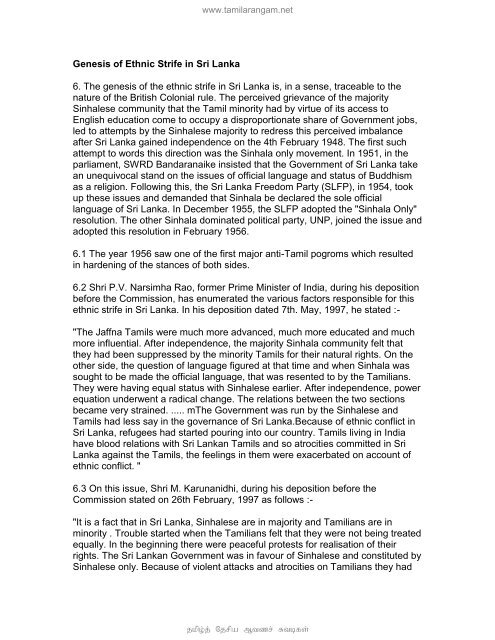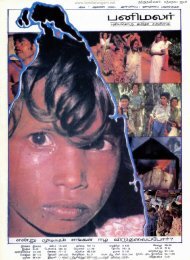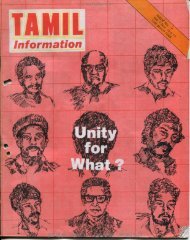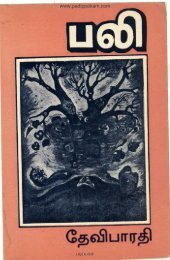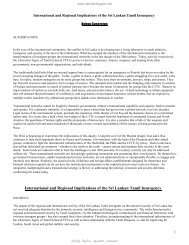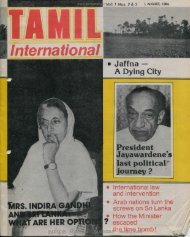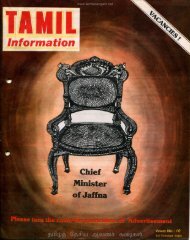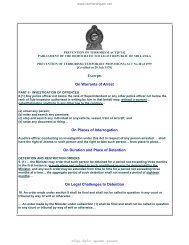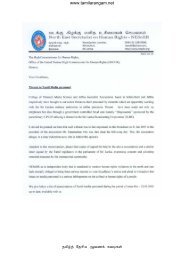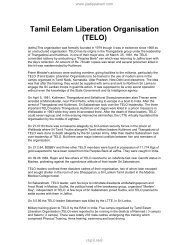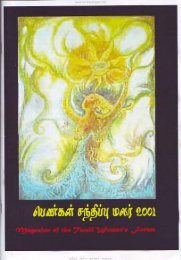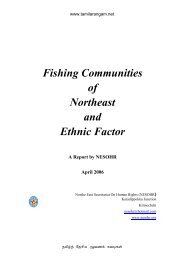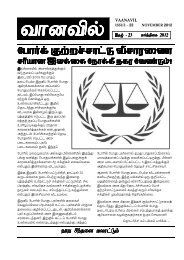Genesis of Ethnic Strife in Sri Lanka
Genesis of Ethnic Strife in Sri Lanka
Genesis of Ethnic Strife in Sri Lanka
Create successful ePaper yourself
Turn your PDF publications into a flip-book with our unique Google optimized e-Paper software.
<strong>Genesis</strong> <strong>of</strong> <strong>Ethnic</strong> <strong>Strife</strong> <strong>in</strong> <strong>Sri</strong> <strong>Lanka</strong><br />
www.tamilarangam.net<br />
6. The genesis <strong>of</strong> the ethnic strife <strong>in</strong> <strong>Sri</strong> <strong>Lanka</strong> is, <strong>in</strong> a sense, traceable to the<br />
nature <strong>of</strong> the British Colonial rule. The perceived grievance <strong>of</strong> the majority<br />
S<strong>in</strong>halese community that the Tamil m<strong>in</strong>ority had by virtue <strong>of</strong> its access to<br />
English education come to occupy a disproportionate share <strong>of</strong> Government jobs,<br />
led to attempts by the S<strong>in</strong>halese majority to redress this perceived imbalance<br />
after <strong>Sri</strong> <strong>Lanka</strong> ga<strong>in</strong>ed <strong>in</strong>dependence on the 4th February 1948. The first such<br />
attempt to words this direction was the S<strong>in</strong>hala only movement. In 1951, <strong>in</strong> the<br />
parliament, SWRD Bandaranaike <strong>in</strong>sisted that the Government <strong>of</strong> <strong>Sri</strong> <strong>Lanka</strong> take<br />
an unequivocal stand on the issues <strong>of</strong> <strong>of</strong>ficial language and status <strong>of</strong> Buddhism<br />
as a religion. Follow<strong>in</strong>g this, the <strong>Sri</strong> <strong>Lanka</strong> Freedom Party (SLFP), <strong>in</strong> 1954, took<br />
up these issues and demanded that S<strong>in</strong>hala be declared the sole <strong>of</strong>ficial<br />
language <strong>of</strong> <strong>Sri</strong> <strong>Lanka</strong>. In December 1955, the SLFP adopted the "S<strong>in</strong>hala Only"<br />
resolution. The other S<strong>in</strong>hala dom<strong>in</strong>ated political party, UNP, jo<strong>in</strong>ed the issue and<br />
adopted this resolution <strong>in</strong> February 1956.<br />
6.1 The year 1956 saw one <strong>of</strong> the first major anti-Tamil pogroms which resulted<br />
<strong>in</strong> harden<strong>in</strong>g <strong>of</strong> the stances <strong>of</strong> both sides.<br />
6.2 Shri P.V. Narsimha Rao, former Prime M<strong>in</strong>ister <strong>of</strong> India, dur<strong>in</strong>g his deposition<br />
before the Commission, has enumerated the various factors responsible for this<br />
ethnic strife <strong>in</strong> <strong>Sri</strong> <strong>Lanka</strong>. In his deposition dated 7th. May, 1997, he stated :-<br />
"The Jaffna Tamils were much more advanced, much more educated and much<br />
more <strong>in</strong>fluential. After <strong>in</strong>dependence, the majority S<strong>in</strong>hala community felt that<br />
they had been suppressed by the m<strong>in</strong>ority Tamils for their natural rights. On the<br />
other side, the question <strong>of</strong> language figured at that time and when S<strong>in</strong>hala was<br />
sought to be made the <strong>of</strong>ficial language, that was resented to by the Tamilians.<br />
They were hav<strong>in</strong>g equal status with S<strong>in</strong>halese earlier. After <strong>in</strong>dependence, power<br />
equation underwent a radical change. The relations between the two sections<br />
became very stra<strong>in</strong>ed. ..... mThe Government was run by the S<strong>in</strong>halese and<br />
Tamils had less say <strong>in</strong> the governance <strong>of</strong> <strong>Sri</strong> <strong>Lanka</strong>.Because <strong>of</strong> ethnic conflict <strong>in</strong><br />
<strong>Sri</strong> <strong>Lanka</strong>, refugees had started pour<strong>in</strong>g <strong>in</strong>to our country. Tamils liv<strong>in</strong>g <strong>in</strong> India<br />
have blood relations with <strong>Sri</strong> <strong>Lanka</strong>n Tamils and so atrocities committed <strong>in</strong> <strong>Sri</strong><br />
<strong>Lanka</strong> aga<strong>in</strong>st the Tamils, the feel<strong>in</strong>gs <strong>in</strong> them were exacerbated on account <strong>of</strong><br />
ethnic conflict. "<br />
6.3 On this issue, Shri M. Karunanidhi, dur<strong>in</strong>g his deposition before the<br />
Commission stated on 26th February, 1997 as follows :-<br />
"It is a fact that <strong>in</strong> <strong>Sri</strong> <strong>Lanka</strong>, S<strong>in</strong>halese are <strong>in</strong> majority and Tamilians are <strong>in</strong><br />
m<strong>in</strong>ority . Trouble started when the Tamilians felt that they were not be<strong>in</strong>g treated<br />
equally. In the beg<strong>in</strong>n<strong>in</strong>g there were peaceful protests for realisation <strong>of</strong> their<br />
rights. The <strong>Sri</strong> <strong>Lanka</strong>n Government was <strong>in</strong> favour <strong>of</strong> S<strong>in</strong>halese and constituted by<br />
S<strong>in</strong>halese only. Because <strong>of</strong> violent attacks and atrocities on Tamilians they had<br />
jkpo;j; Njrpa Mtzr; Rtbfs;
www.tamilarangam.net<br />
to take shelter <strong>in</strong> Tamil Nadu. They had noth<strong>in</strong>g for their self defence with them.<br />
They were rendered homeless. Right from 1956, there was great sympathy <strong>in</strong><br />
Tamil Nadu for <strong>Sri</strong> <strong>Lanka</strong>n Tamils."<br />
6.4 The culm<strong>in</strong>ation <strong>of</strong> the efforts to give S<strong>in</strong>hala language a pre-em<strong>in</strong>ent status<br />
came when the "Official Language Bill" was <strong>in</strong>troduced <strong>in</strong> the <strong>Sri</strong> <strong>Lanka</strong>n<br />
Parliament June 5th, 1956. The Bill was enacted as the "Official Language Act<br />
No. 33." <strong>of</strong> 1956.<br />
6.5 The Act was aimed at effectively end<strong>in</strong>g the dom<strong>in</strong>ation <strong>of</strong> Tamils <strong>in</strong> the<br />
bureaucracy and prevent<strong>in</strong>g them from rega<strong>in</strong><strong>in</strong>g any position <strong>of</strong> dom<strong>in</strong>ance <strong>in</strong><br />
future. The Act envisaged imposition <strong>of</strong> sanctions on Tamil candidates seek<strong>in</strong>g<br />
School admissions and Tamil was removed from its status as one <strong>of</strong> the <strong>of</strong>ficial<br />
languages <strong>of</strong> the country. The Act, thus, resulted <strong>in</strong> the pendulum sw<strong>in</strong>g<strong>in</strong>g the<br />
other way with Tamils be<strong>in</strong>g reduced virtually to the position <strong>of</strong> second-class<br />
citizens.<br />
6.6 At this stage, <strong>in</strong> India, the perception <strong>of</strong> victimisation <strong>of</strong> the <strong>Sri</strong> <strong>Lanka</strong>n Tamils<br />
became sharper especially <strong>in</strong> the m<strong>in</strong>ds <strong>of</strong> those Indian Tamils who were<br />
engaged <strong>in</strong> promot<strong>in</strong>g the concept <strong>of</strong> Dravidianism. Shri M. Karunanidhi, Chief<br />
M<strong>in</strong>ister Tamil Nadu, <strong>in</strong> his deposition dated 22nd. November, 1996, has thrown<br />
light on the perception <strong>of</strong> Indian Tamils on this ongo<strong>in</strong>g strife at that time :-<br />
"After Ceylon became <strong>in</strong>dependent, it used to be called <strong>Sri</strong> <strong>Lanka</strong>. Lots <strong>of</strong><br />
political changes took place <strong>in</strong> <strong>Sri</strong> <strong>Lanka</strong>. <strong>Sri</strong> <strong>Lanka</strong> also promulgated a law that<br />
the <strong>of</strong>ficial language <strong>in</strong> <strong>Sri</strong> <strong>Lanka</strong> would be only S<strong>in</strong>hala. There was<br />
discrim<strong>in</strong>ation <strong>in</strong> giv<strong>in</strong>g education to the Tamils <strong>in</strong> <strong>Sri</strong> <strong>Lanka</strong>. Unless they secure<br />
high marks they were not further encouraged <strong>in</strong> education. S<strong>in</strong>ce Buddhism is<br />
the religion <strong>of</strong> S<strong>in</strong>halese, non - Buddhists like Tamils and Muslims were<br />
compelled to say <strong>in</strong> their prayers 'Buddham Saranam Gachhami'. A law was<br />
made that the prefix '<strong>Sri</strong>' should be written on the vehicles and the boards. The<br />
S<strong>in</strong>halas were deliberately brought <strong>in</strong>to Tamil areas and were settled there. This<br />
was opposed by <strong>Sri</strong> <strong>Lanka</strong>n Tamil leaders like Chelvanayagam and<br />
Amirthal<strong>in</strong>gam."<br />
6.7 Tamil sentiments, hitherto moderate, were be<strong>in</strong>g voiced by the "Federal<br />
Party" led by SJV Chelvanayagam. The party was demand<strong>in</strong>g better rights for<br />
Tamils with<strong>in</strong> the constitutional framework <strong>of</strong> the country. On June 5th, 1956,<br />
while the <strong>Sri</strong> <strong>Lanka</strong>n Parliament assembled to debate on the enactment <strong>of</strong><br />
"S<strong>in</strong>hala Only" Act, a peaceful demonstration was organised by the Federal Party<br />
near the Parliament. The demonstrators were set upon by hundreds <strong>of</strong> organised<br />
S<strong>in</strong>hala fanatics musclemen. In the riot<strong>in</strong>g which followed, the <strong>in</strong>nocent <strong>Sri</strong><br />
<strong>Lanka</strong>n Tamil civilians were the ma<strong>in</strong> targets who were traumatised by acts <strong>of</strong><br />
arson, vandalism, murder and rape.<br />
jkpo;j; Njrpa Mtzr; Rtbfs;
6.8 Subsequent half-hearted measures aimed at assuag<strong>in</strong>g Tamil sentiments<br />
could never succeed as the S<strong>in</strong>hala chauv<strong>in</strong>ism was always the vital decisive<br />
factor <strong>in</strong> all elections. The developments <strong>of</strong> this period have been briefly touched<br />
upon by Shri M. Karunanidhi <strong>in</strong> his deposition dated 22nd. November, 1996, as<br />
follows :-<br />
" Chelvanayagam was known <strong>in</strong> <strong>Sri</strong> <strong>Lanka</strong> as Gandhi <strong>of</strong> Ceylon, he was a<br />
Tamilian. Because <strong>of</strong> his non violent activities Chelvanayagam - Bandaranayake<br />
Accord came <strong>in</strong>to be<strong>in</strong>g <strong>in</strong> 1957. That Accord was never implemented. The<br />
important clause <strong>of</strong> the Accord was that Tamils and Tamil language will be given<br />
importance <strong>in</strong> equal level with S<strong>in</strong>halese. Because the Accord was not<br />
implemented, there were frequent clashes between the S<strong>in</strong>hala community and<br />
the Tamil community and this activity grew till 1982."<br />
6.9 Ms Anita Pratap, a journalist, who extensively covered the <strong>Sri</strong> <strong>Lanka</strong>n ethnic<br />
problem, deposed before the Commission on the various facets <strong>of</strong> the problem.<br />
In her deposition dated 16th. August, 1996, she stated :-<br />
"<strong>Sri</strong> <strong>Lanka</strong>n population consists <strong>of</strong> S<strong>in</strong>halese, Buddhists and Tamilians. Tamilian<br />
population is about 12 percent and S<strong>in</strong>halese population is also more than 70<br />
percent.... <strong>Sri</strong> <strong>Lanka</strong>n Tamilians have aff<strong>in</strong>ity towards Tamilians <strong>in</strong> India....The<br />
Tamil problem <strong>in</strong> <strong>Sri</strong> <strong>Lanka</strong> existed even <strong>in</strong> the seventies. In fact it goes much<br />
earlier. First was <strong>in</strong> 1958. <strong>in</strong> <strong>Sri</strong> <strong>Lanka</strong>. There were atrocities <strong>of</strong> S<strong>in</strong>halese Army<br />
towards Tamils. The <strong>Sri</strong> <strong>Lanka</strong>n Army constituted <strong>of</strong> S<strong>in</strong>halese and <strong>Sri</strong> <strong>Lanka</strong>n<br />
Govt. was also constituted by the S<strong>in</strong>halese Buddhists. The refugee camps <strong>in</strong><br />
India was a burden on India."<br />
6.10 Details <strong>of</strong> the developments have been documented <strong>in</strong> the book captioned<br />
INDO SRI LANKAN RELATIONS by Ravi Kant Dubey <strong>in</strong> CHAPTER 4 : ISSUES<br />
THAT DIVIDE TAMILS AND SINHALESE and are reproduced below :-<br />
Page 68:-<br />
www.tamilarangam.net<br />
"The tension between the two ethnic groups was ris<strong>in</strong>g. Prime M<strong>in</strong>ister<br />
Bhandaranaike had discussion with leader <strong>of</strong> th Federal Party Mr.<br />
Chelvanayakan and they signed a pact on July 27, 1957. which is known as<br />
Bhandaranaike -Chelvanayakam Pact . Accord<strong>in</strong>g to the pact follow<strong>in</strong>g facts<br />
emerged:<br />
i) The Prime M<strong>in</strong>ister was not to discuss anyth<strong>in</strong>g about sett<strong>in</strong>g up <strong>of</strong> a Federal<br />
constitution or regional autonomy or to abrogate Official Language Act.<br />
ii) He agreed to recognise Tamil as the language <strong>of</strong> national m<strong>in</strong>ority <strong>of</strong> Ceylon<br />
and it be made the language <strong>of</strong> adm<strong>in</strong>istration <strong>in</strong> the Northern and Eastern<br />
Prov<strong>in</strong>ces.<br />
jkpo;j; Njrpa Mtzr; Rtbfs;
www.tamilarangam.net<br />
iii) He also assured that the question <strong>of</strong> citizenship to the people <strong>of</strong> Indian orig<strong>in</strong><br />
would be given early consideration.<br />
iv) The Prime M<strong>in</strong>ister also conceded the Tamil demand for establish<strong>in</strong>g Regional<br />
Council <strong>in</strong> the North and the East prov<strong>in</strong>ces. S<strong>in</strong>ce council would have powers<br />
over subjects like agriculture, cooperative,lands and development, colonisation,<br />
education, health, <strong>in</strong>dustries, fishery,hous<strong>in</strong>g, social server, electricity, water<br />
scheme and road. The power <strong>of</strong> taxation was also to be devolved to such<br />
regional council.<br />
v) It was agreed regard<strong>in</strong>g colonisation scheme that the Regional council would<br />
have power to select allottees to whom lands with<strong>in</strong> their area <strong>of</strong> jurisdiction be<br />
alienated and power to select persons be employed for work on such scheme.<br />
Though the pact was not accepted by the Tamils as the f<strong>in</strong>al solution but took it<br />
as a temporary adjustment as it granted concession to Tamil.<br />
Some people believe that had the pact been turned <strong>in</strong>to an Act <strong>of</strong> Parliament the<br />
story <strong>of</strong> S<strong>in</strong>hala - Tamil relation would have been different. But leaders <strong>of</strong> the<br />
right w<strong>in</strong>g S<strong>in</strong>hala politics and some Tamil leaders put obstacles <strong>in</strong> implement<strong>in</strong>g<br />
the pact.<br />
The UNP leader under the leadership <strong>of</strong> S.R. Jayawardene organised a march<br />
from Colombo to Kandy to protest aga<strong>in</strong>st the pact. Various Buddhist groups<br />
brought pressure on the Prime M<strong>in</strong>ister Bhandarnaike aga<strong>in</strong>st the pact. They<br />
termed it as an act <strong>of</strong> treach aga<strong>in</strong>st the S<strong>in</strong>hala nation and as the first step<br />
towards sett<strong>in</strong>g up <strong>of</strong> a separate state,<br />
Tamil leaders who were defeated <strong>in</strong> 1956 criticised the Federal party for<br />
surrender<strong>in</strong>g to the S<strong>in</strong>halas. The Tamil leaders who were cooperat<strong>in</strong>g with<br />
S<strong>in</strong>hala also began to demand federal form and regional autonomy. The Federal<br />
party called <strong>of</strong>f is plan to agitate. Now, it is turn <strong>of</strong> S<strong>in</strong>hala to agitate for<br />
abrogation <strong>of</strong> the pact. They staged a sit <strong>in</strong> demonstration <strong>in</strong> front <strong>of</strong> the PM<br />
residence, even his cab<strong>in</strong>et colleagues pressurised him. F<strong>in</strong>ally, he abrogated<br />
the pact unilaterally.<br />
An ethnic riots followed the Government was forced to declare an emergency<br />
and the riots were quelled with<strong>in</strong> a week. Leaders <strong>of</strong> both sides were put under<br />
house arrest. The Government under the cover <strong>of</strong> emergency passed an Act <strong>in</strong><br />
September 1958, provid<strong>in</strong>g many concessions to the Tamils, such as reasonable<br />
use <strong>of</strong> Tamil for prescribed purposes, right <strong>of</strong> the Tamil people to be taught <strong>in</strong><br />
Tamil language at all levels, right to take public service exam<strong>in</strong>ation <strong>in</strong> Tamil<br />
language with sufficient knowledge <strong>of</strong> S<strong>in</strong>hala, Tamils to correspond with<br />
Government <strong>of</strong>ficial <strong>in</strong> Tamil or <strong>of</strong> any local authority <strong>in</strong> the Northern and Eastern<br />
prov<strong>in</strong>ce. They will not prejudice the use <strong>of</strong> <strong>of</strong>ficial language <strong>in</strong> respect <strong>of</strong><br />
prescribed purpose.<br />
jkpo;j; Njrpa Mtzr; Rtbfs;
www.tamilarangam.net<br />
The Tamils compla<strong>in</strong>ed that 1958 Act has clearly side tracked the major issue <strong>of</strong><br />
form<strong>in</strong>g Regional Council and the stopp<strong>in</strong>g <strong>of</strong> S<strong>in</strong>hala Colonisation <strong>of</strong> the Tamil<br />
Area.<br />
The old practice <strong>of</strong> shar<strong>in</strong>g political power with Tamils was given up. For the first<br />
time, Tamils were not <strong>in</strong>cluded <strong>in</strong> the Cab<strong>in</strong>et between 1956-64. In 1965, no<br />
s<strong>in</strong>gle party got clear majority. The UNP had to secure support <strong>of</strong> the Federal<br />
Party <strong>of</strong> Tamils, to form a coalition Government. Naturally, another agreement<br />
between Dudley Senanayake and Chelvanyayakan was signed. It was on the<br />
basis <strong>of</strong> earlier Bhandaranaike Chelvanayakan agreement. The Pact was signed<br />
on 24 March 1965 a day before D.S.Senanayake was sworn <strong>in</strong> as Prime M<strong>in</strong>ister.<br />
The Pact did not mention anyth<strong>in</strong>g about prov<strong>in</strong>cial or Regional Council, but<br />
Tamils were assured about formation <strong>of</strong> District Council giv<strong>in</strong>g Tamil language a<br />
special position and restrict colonisation <strong>of</strong> Tamil areas by S<strong>in</strong>hala.<br />
As expected the SLFP denounced the agreement. The Communist Party and the<br />
<strong>Lanka</strong> Sama Samaj Party jo<strong>in</strong>ed SLFP <strong>in</strong> start<strong>in</strong>g strong ethnic campaign aga<strong>in</strong>st<br />
the Tamil.<br />
A regulation was passed on January 11, 1996 to grant a special status to Tamil.<br />
The Federal Party for the first time <strong>in</strong> ten years celebrated the Independence Day<br />
<strong>of</strong> <strong>Sri</strong> <strong>Lanka</strong> on 4th February 1966. This regulation made Tamil virtually the<br />
<strong>of</strong>ficial language <strong>in</strong> the Northern and Eastern prov<strong>in</strong>ces. The cont<strong>in</strong>u<strong>in</strong>g tension<br />
between the S<strong>in</strong>hala and Tamils was eas<strong>in</strong>g. Though the Federal Party came out<br />
<strong>of</strong> the coalition <strong>in</strong> April, 1969 yet it supported D.S.Senanayake Government.<br />
Tamils and S<strong>in</strong>hala collaborative politics cont<strong>in</strong>ued and the overall atmosphere <strong>of</strong><br />
ethnic goodwill prevailed.<br />
In 1970 election, UNP was defeated and SLFP and its leftist allies came back to<br />
power. In this election, ethnic question was not given prom<strong>in</strong>ence as it was done<br />
<strong>in</strong> 1956. The Tamils were s<strong>in</strong>cerely <strong>in</strong> a conciliatory mood. Both parties <strong>of</strong> Tamils,<br />
i.e., the Federal Party and the Tamil Congress had voted <strong>in</strong> favour <strong>of</strong> the plan<br />
and for a Constituent Assembly to frame a new constitution.<br />
Then aga<strong>in</strong> <strong>in</strong> 1971, language issue was raised <strong>in</strong> the Constituent Assembly. The<br />
Constituent Assembly debated the issue for four days. The Federal party leader,<br />
Novaratnam made an appeal that this issue be discussed <strong>in</strong> a Round Table<br />
Conference <strong>of</strong> leaders <strong>of</strong> all the political parties.<br />
He was <strong>of</strong> the view that the Constituent Assembly was not the proper place,<br />
where amicable solution to the language problem could be solved. They i.e., the<br />
Federal Party, also placed certa<strong>in</strong> demand to be <strong>in</strong>corporated <strong>in</strong> the constitution.<br />
The constitution framer ignored all these demands and when the 1972<br />
constitution was put <strong>in</strong>to effect the Tamils observed this day as a day <strong>of</strong><br />
mourn<strong>in</strong>g."<br />
jkpo;j; Njrpa Mtzr; Rtbfs;
www.tamilarangam.net<br />
6.11 The enactment <strong>of</strong> a new Republican constitution <strong>in</strong> 1972 made S<strong>in</strong>hala the<br />
<strong>of</strong>ficial language <strong>of</strong> <strong>Sri</strong> <strong>Lanka</strong> and conferred a special status to Buddhism. It was<br />
through this constitution that on May 22nd, 1972, the island became a Republic<br />
and was <strong>of</strong>ficially named as <strong>Sri</strong> <strong>Lanka</strong>.<br />
6.11.1 The Republic <strong>of</strong> <strong>Sri</strong> <strong>Lanka</strong>, as it emerged <strong>in</strong> 1972, had not taken <strong>in</strong>to<br />
account any <strong>of</strong> the Tamil aspirations. Immediately after the new constitution<br />
came <strong>in</strong>to force, the Federal Party (FP) amalgamated with the Tamil Congress<br />
(TC) and Ceylon Workers Congress(CWC) to form Tamil United Front (TUF) - an<br />
umbrella under which all major Tamil parties united to struggle. On October, 2nd,<br />
1972 ( birth anniversary <strong>of</strong> Mahatma Gandhi ), the TUF launched a resistance<br />
campaign and hoisted the Tamil flag - the ris<strong>in</strong>g sun . The <strong>Sri</strong> <strong>Lanka</strong>n<br />
Government took a tough stand and the campaign ended on a violent note.<br />
6.11.2 S.C. Chandrahasan is the son <strong>of</strong> SJV Chelvanayagam, the leader <strong>of</strong> the<br />
`Federal Party'. He is presently based <strong>in</strong> Madras and is engaged <strong>in</strong> efforts to<br />
safeguard the human rights <strong>of</strong> <strong>Sri</strong> <strong>Lanka</strong>n Tamils. He deposed before the<br />
Commission on 22nd. August and 2nd. September, 1996. In his deposition, he<br />
has narrated the situation prevail<strong>in</strong>g <strong>in</strong> <strong>Sri</strong> <strong>Lanka</strong> dur<strong>in</strong>g this time as follows:-<br />
" I was the legal secretary <strong>of</strong> Tamil United Liberation Front (TULF). Dur<strong>in</strong>g that<br />
period I had large number <strong>of</strong> civil rights cases and organised the society by the<br />
name Protection <strong>of</strong> Eelam Tamils from Genocide and other violations <strong>of</strong> Human<br />
rights ( PROTEG). We defended number <strong>of</strong> young Tamils who were charged with<br />
<strong>of</strong>fences and also took up matters before the High Court where persons were<br />
deta<strong>in</strong>ed beyond the period <strong>of</strong> 24 hours without be<strong>in</strong>g produced <strong>in</strong> a Court <strong>of</strong> Law.<br />
The <strong>in</strong>itial period <strong>of</strong> Tamil Struggle was entirely democratic and non violent. Upto<br />
about 1970 it was so. In the year 1971 there was an <strong>in</strong>surrection on the<br />
S<strong>in</strong>halese side. Lot <strong>of</strong> persons (S<strong>in</strong>halese) who were <strong>in</strong>volved were taken <strong>in</strong>to<br />
custody. And some young Tamils who were charged aga<strong>in</strong>st <strong>of</strong>fences were also<br />
taken <strong>in</strong>to custody and were lodged with S<strong>in</strong>halese. Dur<strong>in</strong>g that period I made an<br />
appeal to the Secretary <strong>of</strong> Justice that they should not be kept together because<br />
the non violence struggle had started by the Tamils might change <strong>in</strong>to violent<br />
struggle. After about six months the State authorities did agree, but by that time I<br />
had noticed that damage had been done. From about 1972, more and more acts<br />
<strong>of</strong> violence on the part <strong>of</strong> Tamil Units were noticed. The Tamil Leaders work<strong>in</strong>g<br />
on the Democratic side were los<strong>in</strong>g control. Other organisations like TELO, LTTE,<br />
PLOTE believed that violent means would br<strong>in</strong>g about settlement <strong>of</strong> ethnic<br />
question. The democratic side was represented by TULF. It was a comb<strong>in</strong>ation <strong>of</strong><br />
all Tamil political parties <strong>in</strong> Tamil areas. The TULF resolved its goal <strong>in</strong> its<br />
Convention <strong>in</strong> 1976, that they would fight for a separate <strong>in</strong>dependent Tamil<br />
Eelam. Other Tamil militant Organisations also had the same goal. In 1972, the<br />
Democratic Parties TULF made a basic demand <strong>of</strong> six po<strong>in</strong>ts short <strong>of</strong><br />
<strong>in</strong>dependent Eelam. The request made <strong>in</strong> respect <strong>of</strong> six po<strong>in</strong>ts were not even<br />
acknowledged until 1975. Mr.Chelvanayagam, my father was the leader <strong>of</strong> the<br />
Democratic parties, <strong>in</strong>clud<strong>in</strong>g TULF resigned his Parliamentary seat <strong>in</strong> 1972<br />
jkpo;j; Njrpa Mtzr; Rtbfs;
www.tamilarangam.net<br />
request<strong>in</strong>g the Govt. to have the matter resolved through votes. But the Govt did<br />
not hold elections for three years. My father was the Treasurer <strong>of</strong> the Federal<br />
Party which was the ma<strong>in</strong> constituent <strong>of</strong> TULF. My father entered <strong>in</strong>to a first<br />
agreement historically known as Bhandarnaike Chelvanayagam pact <strong>of</strong> 1957.<br />
Bhandarnaike was the leader <strong>of</strong> SLFP (<strong>Sri</strong> <strong>Lanka</strong> Freedom Party). Aga<strong>in</strong>st this<br />
Pact there was an upris<strong>in</strong>g led by Buddhists priests provoked by Jayawardhane<br />
who was the Leader <strong>of</strong> Opposition UNP Party. This opposition f<strong>in</strong>ally culm<strong>in</strong>ated<br />
<strong>in</strong>to surround<strong>in</strong>g <strong>of</strong> the Prime M<strong>in</strong>isters house by 2000 Buddhist priests and they<br />
<strong>in</strong>sisted that he comes out and tear the Pact. F<strong>in</strong>ally Shri Bhandaranaike had to<br />
do that. In 1960 there were two agreements which were not reduced <strong>in</strong>to writ<strong>in</strong>g.<br />
United National Party won the election but did not command majority. In order to<br />
get the support <strong>of</strong> the Party led by my father, they made an agreement with my<br />
father. Aga<strong>in</strong> due to the opposition by the Chief Buddhist priest, UNP withdrew<br />
from its promises and dissolved the Parliament. In July SLFP came <strong>in</strong>to power<br />
they aga<strong>in</strong> made certa<strong>in</strong> promises and agreed and Mr.Bhandarnaike was shot<br />
dead by a priest and Mrs. Bhandarnaike came to power. She was elected <strong>in</strong> July<br />
1960 and she promised to restore Bhandarnaike Chelvanayagam Pact. She<br />
aga<strong>in</strong> at the persistence <strong>of</strong> Buddhist priest withdrew from the Agreement. In 1965<br />
a Pact was entered <strong>in</strong>to known as Senanayake Chelvanayagam pact. This aga<strong>in</strong><br />
was between UNP and my father. Mrs. Bhandarnaike led the Buddhist priest <strong>in</strong><br />
protest and Senanayake withdrew from the Pact.<br />
In 1977 there was an election. The TULF persuaded the militants to accept the<br />
non- violent process and put forward the manifesto <strong>of</strong> TULF and wanted to vote<br />
the Tamils for the aga<strong>in</strong>st thereby give a mandate to the Tamil United Front. All<br />
Tamil militant organisations agreed for this. And the Election was fought on that<br />
basis. Tamil areas overwhelm<strong>in</strong>gly voted for the mandate. Jayawardene came as<br />
the Prime M<strong>in</strong>ister with a overwhelm<strong>in</strong>g victory on the S<strong>in</strong>halese side. With<strong>in</strong> two<br />
weeks <strong>of</strong> the election the S<strong>in</strong>halese extremist forces precipitated it a Pogrom<br />
aga<strong>in</strong>st the Tamils. It was a group manipulated by them aga<strong>in</strong>st the group. UNP<br />
was beh<strong>in</strong>d it. Jayawardene's speech over the radio made the violence spread all<br />
round the Island <strong>in</strong> the S<strong>in</strong>halese areas. More than about hundred thousand<br />
Tamils were rendered homeless and many thousands were killed. That was a<br />
very bitter pogrom that went on. Jayawardene's words were that I do not say so,<br />
but S<strong>in</strong>halese say if the Tamils want peace, they may have peace, if they want<br />
war, they will have war. With<strong>in</strong> m<strong>in</strong>utes <strong>of</strong> this broadcast, the whole island was <strong>in</strong><br />
flames. The impact <strong>of</strong> this pogrom was that, Tamil militant groups took the<br />
decision that democracy and non violence will not work and they must start a<br />
violent process to w<strong>in</strong> their rights.<br />
For the first time I came to India <strong>in</strong> 1977 for medical reasons.... The Tamil<br />
militants started com<strong>in</strong>g to India <strong>in</strong> the years 1973/74. That was the period <strong>Sri</strong><br />
<strong>Lanka</strong>n Govt. was arrest<strong>in</strong>g Activist Tamil Youths. Most <strong>of</strong> them had not their<br />
militant thoughts but gradually they were <strong>in</strong>volved <strong>in</strong> that. So they had to run<br />
away from the <strong>Sri</strong> <strong>Lanka</strong>n Govt.<br />
jkpo;j; Njrpa Mtzr; Rtbfs;
www.tamilarangam.net<br />
Most <strong>of</strong> the youths started writ<strong>in</strong>g on the wall and Prabhakaran was one <strong>of</strong> them.<br />
They made protests when they had put up a Lion's flag <strong>in</strong> a school. It was <strong>in</strong> that<br />
connection when he was wanted, he came to India. He came to India at the age<br />
<strong>of</strong> 13 or 14. Thereafter he was mov<strong>in</strong>g up and down, that is visit<strong>in</strong>g the Island<br />
and com<strong>in</strong>g to India. In mid seventies Prabhakaran shaped an organisation <strong>in</strong> the<br />
form <strong>of</strong> LTTE. Initially both Prabhakaran and Uma Maheswaran jo<strong>in</strong>ed it, they<br />
were <strong>in</strong> the same organisation. In 1980 they fell out and there was a possibility <strong>of</strong><br />
shoot-out. They were both <strong>in</strong> Madras. Differences surfaced <strong>in</strong> a meet<strong>in</strong>g and then<br />
they fell out. In 1980 they were persuaded not to <strong>in</strong>dulge <strong>in</strong> violence aga<strong>in</strong>st each<br />
other. In 1980 I was able to <strong>in</strong>fluence both <strong>of</strong> them. No Indian leader was<br />
<strong>in</strong>volved at that time <strong>in</strong> this persuasion to my knowledge. Both the groups started<br />
build<strong>in</strong>g up <strong>in</strong> the Island. There was so much repression <strong>in</strong> the Island aga<strong>in</strong>st<br />
Tamils by the Govt. From every family young Tamils started jo<strong>in</strong><strong>in</strong>g some<br />
groups."<br />
6.12 On January 10, 1974, dur<strong>in</strong>g the fourth "International Conference <strong>of</strong> Tamil<br />
Research" held <strong>in</strong> Jaffna, the police used force to disperse nearly 100,000 Tamils.<br />
This led to the electrocution <strong>of</strong> people and a massive stampede, which killed<br />
eight and <strong>in</strong>jured many. The popular feel<strong>in</strong>g <strong>in</strong> the Tamil dom<strong>in</strong>ated areas was<br />
that those who lost their lives were national heroes-a monument was built <strong>in</strong> their<br />
honour.<br />
These developments gave a fresh impetus to the youth <strong>in</strong> the party to take up<br />
arms. A new chapter <strong>in</strong> the history <strong>of</strong> <strong>Sri</strong> <strong>Lanka</strong>n Tamil struggle began with the<br />
formation <strong>of</strong> Tamil New Tigers (TNT) - a purely militant outfit, which was seen as<br />
the strong arm <strong>of</strong> the TUF. The TNT leader was Chetty Thanabalas<strong>in</strong>gham, and<br />
V. Prabhakaran was one <strong>of</strong> its important members <strong>of</strong> the TNT when it was<br />
formed. The TNT was responsible for several terrorist acts <strong>in</strong> <strong>Sri</strong> <strong>Lanka</strong>. The<br />
most important be<strong>in</strong>g the assass<strong>in</strong>ation <strong>of</strong> Mayor <strong>of</strong> Jaffna on July 5, 1975.<br />
6.13 The Tamil United Front (TUF) spearhead<strong>in</strong>g the Tamil demands was forced<br />
under the circumstances to further harden their stand. In a conference on May<br />
14th, 1976, at Vaddukodai, the party changed its name to "Tamil United<br />
Liberation Front" and passed the follow<strong>in</strong>g resolution :-<br />
"We are hereby committed to the restoration and re-constitution <strong>of</strong> the Free,<br />
Sovereign Secular Socialist State <strong>of</strong> Tamil Elam based on the right <strong>of</strong> selfdeterm<strong>in</strong>ation<br />
<strong>in</strong>herent <strong>in</strong> every nation. This has become <strong>in</strong>evitable to safeguard<br />
the very existence <strong>of</strong> the Tamil people <strong>in</strong> <strong>Sri</strong> <strong>Lanka</strong>."<br />
6.14 This heralded the beg<strong>in</strong>n<strong>in</strong>g <strong>of</strong> a violent era when Tamil militancy legitimised<br />
its existence and drew support from various quarters <strong>in</strong> a serious process <strong>of</strong><br />
arm<strong>in</strong>g and tra<strong>in</strong><strong>in</strong>g <strong>in</strong> <strong>Sri</strong> <strong>Lanka</strong>n Tamil youth. Dur<strong>in</strong>g the period 1976-1979, the<br />
Tamil militants carried out several assass<strong>in</strong>ations and other terrorist acts.<br />
jkpo;j; Njrpa Mtzr; Rtbfs;
6.15 In July 1979, faced with mount<strong>in</strong>g acts <strong>of</strong> terrorism Government <strong>of</strong> <strong>Sri</strong> <strong>Lanka</strong><br />
<strong>in</strong>troduced new laws to combat terrorism. The most drastic <strong>of</strong> these was known<br />
as the Prevention <strong>of</strong> Terrorism Act (PTA). The PTA was seen as an Act<br />
encroach<strong>in</strong>g upon human rights and many who were dedicated to uphold<strong>in</strong>g<br />
democratic ideals campaigned aga<strong>in</strong>st it protest<strong>in</strong>g aga<strong>in</strong>st the possibility <strong>of</strong><br />
political abuse <strong>of</strong> the wide rang<strong>in</strong>g powers granted under the PTA. The militant<br />
activities <strong>of</strong> the Tamil youth, however, cont<strong>in</strong>ued unabated <strong>in</strong>vit<strong>in</strong>g swift and<br />
disproportionate reprisals from the <strong>Sri</strong> <strong>Lanka</strong>n law enforcers.<br />
6.16 S.C. Chandrahasan, <strong>in</strong> his deposition before the Commission given on 2nd.<br />
September, 1996, narrates how all efforts were made by the moderate sections<br />
<strong>of</strong> the <strong>Sri</strong> <strong>Lanka</strong>n Tamils to arrive at an amicable solution. He states :-<br />
"In 1976 at the Vaddukottai convention, my father did mention we took all<br />
possible steps to live with the S<strong>in</strong>halese but they have not shown any keenness<br />
to live with Tamils. We have no option except to ask for a separate Tamil Eelam.<br />
He was a conv<strong>in</strong>ced non- violent politician. There was cont<strong>in</strong>ued oppression on<br />
the Tamil people that was the reason for demand<strong>in</strong>g separate Tamil Eelam. "<br />
S.C Chandrahasan further stated that :-<br />
www.tamilarangam.net<br />
"I was <strong>in</strong> the Tamil United Liberation Front and thereafter s<strong>in</strong>ce I am <strong>in</strong> India I am<br />
work<strong>in</strong>g <strong>in</strong> the two organisations PROTEG and OFERR (Organisation for Eelam<br />
Refugees Rehabilitation ). In the early stages we did feel that the militant<br />
organisations also play a positive role. After the time when they started kill<strong>in</strong>g<br />
<strong>in</strong>nocent civilians we began to criticise them and tried to correct them. We have<br />
been criticis<strong>in</strong>g every militant organisation. TULF did lose predom<strong>in</strong>ance<br />
basically because due to the amendment <strong>of</strong> the Constitution they could not<br />
function as a Parliamentary Political party."<br />
6.17 This <strong>in</strong>dicates that although a section <strong>of</strong> the <strong>Sri</strong> <strong>Lanka</strong>n Tamils, who were<br />
hitherto the representatives <strong>of</strong> the majority <strong>of</strong> the Tamil population cont<strong>in</strong>ued to<br />
earnestly strive for a peaceful solution, the repeated provocative actions <strong>of</strong> the<br />
<strong>Sri</strong> <strong>Lanka</strong>n Government as well as the <strong>in</strong>creas<strong>in</strong>gly <strong>in</strong>tolerant attitude <strong>of</strong> the<br />
emerg<strong>in</strong>g <strong>Sri</strong> <strong>Lanka</strong>n Tamil militant groups gradually led to a worsen<strong>in</strong>g situation<br />
which could not be retrieved. Due to repeated acts <strong>of</strong> violence aga<strong>in</strong>st the Tamil<br />
m<strong>in</strong>orities <strong>in</strong> <strong>Sri</strong> <strong>Lanka</strong> and the popularly perceived <strong>in</strong>sensitivity on part <strong>of</strong> the <strong>Sri</strong><br />
<strong>Lanka</strong>n Government, even peace lov<strong>in</strong>g moderate Tamils hardened their attitude,<br />
and, <strong>in</strong> face <strong>of</strong> repeated atrocities by <strong>Sri</strong> <strong>Lanka</strong>n Security forces on them, started<br />
look<strong>in</strong>g up to the Tamil militant elements engaged <strong>in</strong> the struggle for self<br />
determ<strong>in</strong>ation, as their 'saviours'.<br />
6.18 The <strong>Sri</strong> <strong>Lanka</strong>n Government cont<strong>in</strong>ued to hold secret negotiations with the<br />
TULF and these negotiations led to the creation <strong>of</strong> the District Development<br />
Council (DDCs). In June 1981, there were elections to the District Development<br />
Council <strong>of</strong> Jaffna. On the event <strong>of</strong> the elections, the police and the Tamil youth<br />
jkpo;j; Njrpa Mtzr; Rtbfs;
www.tamilarangam.net<br />
clashed and the police burnt the TULF headquarters <strong>in</strong> Jaffna, the Jaffna public<br />
library, and the residence <strong>of</strong> V.Yogeswaran, the Member <strong>of</strong> Parliament for Jaffna.<br />
6.19 The burn<strong>in</strong>g <strong>of</strong> the Jaffna Library, which had over 97,000 books and was<br />
one <strong>of</strong> the f<strong>in</strong>est <strong>in</strong> South Asia, was condemned by many with<strong>in</strong> and outside <strong>Sri</strong><br />
<strong>Lanka</strong> as a dastardly crime; The 1981 anti-Tamil riots ushered <strong>in</strong> a violent era- a<br />
period which some Tamil militants dom<strong>in</strong>at<strong>in</strong>g over the moderates while the<br />
public <strong>in</strong> general perceived a separate Tamil State as the only viable solution to<br />
the problem.<br />
6.20 P.Nedumaran, a leader <strong>of</strong> the Tamil Nadu Kamaraj Congress (TNKC), who<br />
has been a lead<strong>in</strong>g supporter <strong>of</strong> the LTTE <strong>in</strong> Tamil Nadu, has narrated this<br />
<strong>in</strong>cident and the concern it caused <strong>in</strong> his Affidavit No.87/93-JCI filed before the<br />
Commission. Accord<strong>in</strong>g to him :-<br />
Para-3 ".....the Eelam problem got the attention <strong>of</strong> the Indian people as well as<br />
the International arena when the Jaffna library was burnt by the <strong>Sri</strong> <strong>Lanka</strong>n army<br />
on June 31, 1981 and the result<strong>in</strong>g attacks on Tamils. Dur<strong>in</strong>g October, 1981, I<br />
had been to the Riot hit Tamil areas <strong>of</strong> <strong>Sri</strong> <strong>Lanka</strong> to ascerta<strong>in</strong> the facts and<br />
materials. At <strong>Sri</strong> <strong>Lanka</strong> I met Mr.A Amirthal<strong>in</strong>gam, the <strong>Sri</strong> <strong>Lanka</strong>n M<strong>in</strong>ister<br />
Mr.Thondaman and other leaders and submitted a report to the then Chief<br />
M<strong>in</strong>ister <strong>of</strong> Tamil Nadu, Mr.M.G.Ramachandran (known as M.G.R.) (Annexure<br />
No.1). Immediately an all party delegation <strong>in</strong>clud<strong>in</strong>g myself under the leadership<br />
<strong>of</strong> Mr.M.G.R. met Mrs. Gandhi at New Delhi on 07.12.1981 and submitted a<br />
petition. On 19.09.1982, I moved a resolution <strong>in</strong> the Tamil Nadu legislature which<br />
sought the cancellation <strong>of</strong> the death sentence on the Tamil youth leaders<br />
Thangadurai and Kuttimani and the same was unanimously passed."<br />
6.21 At this stage, it appears that the concerns <strong>of</strong> India with regard to the ethnic<br />
crisis were manifold. Besides the issue <strong>of</strong> refugees, this cont<strong>in</strong>u<strong>in</strong>g ethnic conflict<br />
was was also pos<strong>in</strong>g a potential danger to the national security <strong>of</strong> India. This has<br />
been brought out by former Prime M<strong>in</strong>ister, Shri P.V. Narsimha Rao dur<strong>in</strong>g his<br />
deposition before the Commission on 7th. May, 1997. He stated :-<br />
"The Indian Govt had to organise and establish refugee camps and had to spend<br />
money on them. It was the concern <strong>of</strong> the Govt that the refugees may leave and<br />
go back to <strong>Sri</strong> lanka and peace be restored there. That could only happen when<br />
political solution could be made <strong>of</strong> the problem. We were all engaged <strong>in</strong> this<br />
solution <strong>of</strong> ethnic problem. Our security angle was also there. That was an<br />
important factor <strong>in</strong> our consideration. We stood for a unified <strong>Sri</strong> <strong>Lanka</strong> with<strong>in</strong><br />
which both communities could live peacefully. This how we got <strong>in</strong>to the political<br />
aspect <strong>of</strong> it, security aspect <strong>of</strong> it and cultural aspect <strong>of</strong> it. Diego Garcia was the<br />
American Base and from there they were operat<strong>in</strong>g surveillance activities. It was<br />
concern for our national security. The <strong>in</strong>stitution <strong>of</strong> Voice <strong>of</strong> America was<br />
established <strong>in</strong> <strong>Sri</strong> <strong>Lanka</strong>. It became part <strong>of</strong> the Accord and under the Accord it<br />
was to be closed. Someth<strong>in</strong>g was to be done which was our concern. If India<br />
jkpo;j; Njrpa Mtzr; Rtbfs;
www.tamilarangam.net<br />
would not have <strong>in</strong>tervened, two or three th<strong>in</strong>gs could have happened. <strong>Sri</strong> <strong>Lanka</strong>n<br />
President would have approached Pakistan, Mossad <strong>of</strong> Israel to go to their help.<br />
That would have been dangerous to us. No one could have understood the<br />
problem as clearly as we could. They would have simply taken the law and order<br />
situation and noth<strong>in</strong>g beyond that. One does not know what else option could<br />
have been adopted by <strong>Sri</strong> <strong>Lanka</strong>n Govt. We had some such <strong>in</strong>formation that <strong>Sri</strong><br />
<strong>Lanka</strong>ns were hav<strong>in</strong>g dialogue with them. They were giv<strong>in</strong>g out that they were<br />
not depend<strong>in</strong>g on India alone; they would look elsewhere.<br />
Our policy towards <strong>Sri</strong> <strong>Lanka</strong> was the same throughout. We stood for the unity <strong>of</strong><br />
<strong>Sri</strong> <strong>Lanka</strong> with<strong>in</strong> which both the communities would have their own say. We<br />
wanted their good neighbourl<strong>in</strong>ess."<br />
6.21.1 These considerations, among others , also f<strong>in</strong>d a place <strong>in</strong> Annexure I<br />
enclosed with the affidavit <strong>of</strong> P. Nedumaran which is a report presented by him to<br />
the Chief M<strong>in</strong>ister <strong>of</strong> Tamil Nadu after a n<strong>in</strong>e day tour to <strong>Sri</strong> <strong>Lanka</strong> from<br />
September 27 1981 to October 6, 1981. This is a contemporaneous document<br />
which graphically describes the prevail<strong>in</strong>g situation <strong>in</strong> <strong>Sri</strong> <strong>Lanka</strong> at that time and<br />
also attempts to trace the genesis <strong>of</strong> the problem. Most <strong>of</strong> the arguments<br />
<strong>in</strong>corporated <strong>in</strong> the report are based on actual data and its <strong>in</strong>terpretation. Events,<br />
as they unfolded at that time, have also been recorded <strong>in</strong> the report. This report ,<br />
therefore, can be relied upon for the limited objective <strong>of</strong> trac<strong>in</strong>g the sequence <strong>of</strong><br />
events as they occurred <strong>in</strong> <strong>Sri</strong> <strong>Lanka</strong> at that time. Relevant portions <strong>of</strong> the report<br />
are reproduced below :-<br />
<strong>Sri</strong> <strong>Lanka</strong> Tamils Problem: A Shock<strong>in</strong>g Revelation"<br />
"The follow<strong>in</strong>g is the brief report on the problems <strong>of</strong> <strong>Sri</strong> <strong>Lanka</strong>-Tamils presented<br />
by <strong>Sri</strong> P.Nedumaran, M.A., M.L.A., President Tamil Nadu Congress Party(K), <strong>in</strong><br />
the All party Leaders Meet<strong>in</strong>g convened by the Hon. Chief M<strong>in</strong>ister <strong>of</strong> Tamil Nadu<br />
<strong>Sri</strong> M.G.Ramachandran, on October 6, 1981 at Madras. The report is based on<br />
facts obta<strong>in</strong>ed through personal <strong>in</strong>vestigation dur<strong>in</strong>g <strong>Sri</strong> P.Nedumaran's<br />
extensive tour from September 27, to October 6, 1981 <strong>in</strong> the trouble-torn areas <strong>of</strong><br />
<strong>Sri</strong> <strong>Lanka</strong> where Tamil community are predom<strong>in</strong>ant.<br />
"For the greatest crime <strong>of</strong> man Is that he was born"<br />
I visited Jaffna (Eelam) and parts <strong>of</strong> hill areas <strong>in</strong> <strong>Sri</strong> <strong>Lanka</strong> where Tamilian<br />
Plantation worker live predom<strong>in</strong>antly <strong>in</strong> order to console the afflicted on behalf <strong>of</strong><br />
the people <strong>of</strong> Tamil Nadu. I had many opportunities to witness the extensive<br />
damage done to their properties <strong>in</strong> various places.<br />
I had talks with <strong>Sri</strong> A.Amirdal<strong>in</strong>gam, leader <strong>of</strong> the opposition <strong>in</strong> <strong>Sri</strong> <strong>Lanka</strong>n<br />
Parliament and also President <strong>of</strong> the Tamil United Liberation Front,(TULF) Hon.<br />
M<strong>in</strong>ister <strong>Sri</strong> Thondaiman, Tamil members <strong>of</strong> the Parliament <strong>of</strong> <strong>Sri</strong> <strong>Lanka</strong>,<br />
President <strong>of</strong> the District Development Councils, Pr<strong>of</strong>essors <strong>of</strong> University students,<br />
jkpo;j; Njrpa Mtzr; Rtbfs;
lawyers, doctors, religious leaders, teachers, trade union leaders and<br />
Government employees and acquired personal knowledge <strong>of</strong> the calamities and<br />
shock<strong>in</strong>g events unleashed dur<strong>in</strong>g the recent riots. I also had discussions with<br />
the Indian High Commissioner <strong>in</strong> <strong>Sri</strong> <strong>Lanka</strong>, <strong>Sri</strong> Abraham, on the afflictions<br />
caused by the racial carnage.<br />
Dur<strong>in</strong>g the 1977 riots the Eelam Tamils bore the brunt <strong>of</strong> the attack. It was<br />
s<strong>in</strong>gularly aimed at them result<strong>in</strong>g <strong>in</strong> heavy loss <strong>of</strong> life. On the contrary, the<br />
recent riots, dur<strong>in</strong>g May, June, July and August, <strong>in</strong> 1981, were aimed at<br />
destruction <strong>of</strong> the economic power <strong>of</strong> the Tamils <strong>of</strong> Indian orig<strong>in</strong>. The shops,<br />
estates, farms, factories, hotels and residences owned by the Tamils <strong>of</strong> Indian<br />
orig<strong>in</strong> suffered total destructions with the aim to uproot them. The S<strong>in</strong>hala<br />
chauv<strong>in</strong>ists burnt down to ashes the Jaffna library, a proud possession <strong>of</strong> the<br />
Tamils, with the view to annihilate the Tamil culture. It rem<strong>in</strong>ds one <strong>of</strong> the<br />
destruction <strong>of</strong> the great library by the Gauls at Alexandria, the seat <strong>of</strong> Oriental<br />
civilization and <strong>of</strong> the Byzant<strong>in</strong>e Library, the rendezvous <strong>of</strong> the great civilizations<br />
<strong>of</strong> the East and the West, by the turks.<br />
The recent riots were carried on with the connivance <strong>of</strong> the <strong>Sri</strong> <strong>Lanka</strong>n army and<br />
police. The Jaffna areas looked deserted. The <strong>Sri</strong> <strong>Lanka</strong>n army took over law<br />
and order. A ban on the possession <strong>of</strong> arms was enforced only on the Tamilian<br />
areas. Any one <strong>in</strong> possession <strong>of</strong> arms carried the risk <strong>of</strong> capital punishment. A<br />
large number <strong>of</strong> Tamil youths were taken <strong>in</strong>to custody under the pretext <strong>of</strong><br />
enquiry. A separate unit <strong>of</strong> the army was engaged to hunt after the Tamil youths<br />
brand<strong>in</strong>g them as terrorists. S<strong>in</strong>ce emergency was <strong>in</strong> force no appeal could be<br />
made <strong>in</strong> a court <strong>of</strong> law. The <strong>Sri</strong> <strong>Lanka</strong>n army turned out to be the worst<br />
perpetrators <strong>of</strong> violence abhorrent to human civilization. The atrocities committed<br />
by the Pakistani army <strong>in</strong> Bangla Desh are a parallel to the crimes <strong>in</strong>dulged <strong>in</strong> by<br />
the <strong>Sri</strong> <strong>Lanka</strong>n Army on the Tamils <strong>of</strong> Indian orig<strong>in</strong> and <strong>of</strong> Eelam.<br />
S<strong>in</strong>ce the Tamils are feared as Security risk their entry <strong>in</strong>to the army and police<br />
force is severely restricted. They constitute a negligible number both <strong>in</strong> the army<br />
and police forces as shown below:- Total Nmber Number <strong>of</strong> Tamils Police 17,000<br />
476<br />
Army 11,000 220<br />
Navy 2,000 20<br />
Air Force 6,000 6<br />
Reasons for the Riots<br />
www.tamilarangam.net<br />
Of the many reasons that triggered <strong>of</strong>f the terrible riots the most significant one<br />
was the <strong>Sri</strong>mavo- Shastry Pact. Racial riots were resorted to by the governmentmach<strong>in</strong>ery<br />
to create on exigency for mass exodus <strong>of</strong> the Tamils <strong>of</strong> Indian orig<strong>in</strong><br />
jkpo;j; Njrpa Mtzr; Rtbfs;
as the <strong>Sri</strong>mavo-Shastry Pact was on the br<strong>in</strong>k <strong>of</strong> expiry. Secondly, the dreadful<br />
actions like dacoity, murder and arson committed on the Eelam Tamils by the<br />
army and police forces on the eve <strong>of</strong> the elections to the District Development<br />
Councils with the view to defeat the Tamil United Liberation Front lit the fire <strong>of</strong><br />
civil anarchy. It was kept alive by the <strong>in</strong>furiated speeches by the, S<strong>in</strong>hala<br />
members and m<strong>in</strong>isters <strong>in</strong> the Parliament on the occasion <strong>of</strong> the no-confidence<br />
motion moved aga<strong>in</strong>st <strong>Sri</strong> A.Amirdal<strong>in</strong>gam, M.P., and leader <strong>of</strong> the TULF. These<br />
speeches were later pr<strong>in</strong>ted and distributed among the S<strong>in</strong>hala people to <strong>in</strong>duce<br />
racial discrim<strong>in</strong>ation and riots. The immediate cause for the recent riot was the<br />
new grad<strong>in</strong>g system <strong>in</strong>troduced by the Government to tamper with the marks <strong>of</strong><br />
the Tamil students. The computors considerably slashed down the high marks<br />
secured by the Tamil students to deny admissions to pr<strong>of</strong>essional courses and<br />
higher studies. The ultimate goal <strong>of</strong> these riots was to reduce the Eelam Tamils<br />
to a passive m<strong>in</strong>ority by forc<strong>in</strong>g the Tamils <strong>of</strong> Indian orig<strong>in</strong> to opt for voluntary<br />
repatriation.<br />
Eeconomy<br />
The economic policy <strong>of</strong> the <strong>Sri</strong> <strong>Lanka</strong>n Government was lopsided. The guid<strong>in</strong>g<br />
spirit <strong>of</strong> their developmental programme was to liquidate the economic power <strong>of</strong><br />
the Tamils. Tamil areas were completely ignored <strong>in</strong> the execution <strong>of</strong> planed<br />
development. Permissions were not granted to the Tamils to start new <strong>in</strong>dustries<br />
with foreign aid. The Government <strong>of</strong> <strong>Sri</strong> <strong>Lanka</strong> had also transferred some <strong>of</strong> the<br />
major <strong>in</strong>dustries located <strong>in</strong> Tamil districts to S<strong>in</strong>hala majority areas. For example,<br />
it has been proposed to transfer 'SI-NOR' project, a fourteen year old fish<strong>in</strong>g<br />
scheme aided by Norway, from the Jaffna District to a S<strong>in</strong>hala area. Another<br />
example <strong>of</strong> racial discrim<strong>in</strong>ation was the irrational distribution <strong>of</strong> foreign relieffunds<br />
when <strong>Sri</strong> <strong>Lanka</strong> was hit by Cyclone <strong>in</strong> 1979. Mattakalapu, recently known<br />
as Batticaloa <strong>in</strong> S<strong>in</strong>halese was completely devastated and Polanaruva suffered<br />
m<strong>in</strong>or damage. In the distribution <strong>of</strong> funds, Mattakalapu, a Tamil dom<strong>in</strong>ated area,<br />
received only 20% <strong>of</strong> the funds and the rest was spent on Polanaruva, a S<strong>in</strong>hala<br />
dom<strong>in</strong>ated area.<br />
Such discrim<strong>in</strong>ations <strong>in</strong> their economic policy forced the Tamils to depend on<br />
agriculture which was deliberately ignored to suppress them socially. There has<br />
been no execution <strong>of</strong> new irrigation scheme. Repair works <strong>in</strong> the irrigation tanks<br />
<strong>in</strong> the Tamilian areas have been neglected s<strong>in</strong>ce long. Tamil agricultures were<br />
made to suffer further loss by import<strong>in</strong>g the same products that they produced.<br />
Education and Employment<br />
www.tamilarangam.net<br />
A more significant damage was done <strong>in</strong> the field <strong>of</strong> education. The Tamilian<br />
schools were neglected. They suffered for want <strong>of</strong> adequate staff and funds.<br />
Quite a large number <strong>of</strong> posts are not filled because Tamilian teachers are<br />
normally denied teach<strong>in</strong>g positions.<br />
jkpo;j; Njrpa Mtzr; Rtbfs;
The grad<strong>in</strong>g system <strong>in</strong>troduced recently did real havoc. With the help <strong>of</strong><br />
computors, the authorities rigged the marks, <strong>of</strong> Tamilian students by fraudulent<br />
devices <strong>in</strong> order to block admissions to pr<strong>of</strong>essional courses. Such measures<br />
ultimately led to massive unemployment problem among Tamils. While nearly<br />
5,000 S<strong>in</strong>halese were employed <strong>in</strong> a S<strong>in</strong>hala constituency only 200 Tamils alone<br />
could secure jobs due to lack <strong>of</strong> job opportunities <strong>in</strong> a Tamil constituency.<br />
Language and Employment<br />
The 1956 S<strong>in</strong>hala Official Language Act brought constra<strong>in</strong>s on Tamils. It affected<br />
the promotional opportunities <strong>of</strong> Tamils <strong>in</strong> Government services and limited their<br />
job opportunities. Annual <strong>in</strong>crements <strong>of</strong> Tamil Officers <strong>in</strong> Government services<br />
were stopped to force them learn S<strong>in</strong>halese. In Schools S<strong>in</strong>halese was made<br />
compulsory. The narrow language policy <strong>of</strong> <strong>Sri</strong> <strong>Lanka</strong> deprived the m<strong>in</strong>ority<br />
Tamils from enter<strong>in</strong>g government services and made them secondary citizens.<br />
The Statistics provided below show the dw<strong>in</strong>dl<strong>in</strong>g number <strong>of</strong> Tamils <strong>in</strong><br />
government services s<strong>in</strong>ce 1956.<br />
Pecentage <strong>of</strong> Tamils <strong>in</strong> Employment<br />
www.tamilarangam.net<br />
__________________________________________________<br />
Year 1956, 1965, 1970<br />
__________________________________________________<br />
Adm<strong>in</strong>istration 30%, 20%, 5%<br />
Postal, Railway, Medical 50%, 20%, 5%<br />
Lectures 60%, 30%, 10%<br />
Army 40%, 20%, 1%<br />
Unskilled & Semiskilled 45%, 25%, 5% labourers<br />
__________________________________________________<br />
The <strong>of</strong>ficial language Act created a wave <strong>of</strong> reaction Consequent on this an<br />
agreement was reached between the leaders <strong>of</strong> TULF and former <strong>Sri</strong> <strong>Lanka</strong>n<br />
Premier, Bandarnaike. Later a special act assur<strong>in</strong>g the use <strong>of</strong> Tamil <strong>in</strong> the<br />
adm<strong>in</strong>istration to a reasonable extent was passed <strong>in</strong> 1958. This Act has not been<br />
implemented till date. In the meanwhile another act was passed <strong>in</strong> 1960 mak<strong>in</strong>g<br />
S<strong>in</strong>halese the only court language. <strong>in</strong> 1961, contra to the previous agreements,<br />
S<strong>in</strong>halese was made the only <strong>of</strong>ficial language <strong>of</strong> <strong>Sri</strong> <strong>Lanka</strong>.<br />
This policy to a very large extent m<strong>in</strong>imised the chances <strong>of</strong> Tamilians gett<strong>in</strong>g<br />
employment <strong>in</strong> the public and private sectors. The follow<strong>in</strong>g table provides details<br />
about the number <strong>of</strong> Tamilians <strong>in</strong> government services <strong>in</strong> 1980.<br />
__________________________________________________<br />
jkpo;j; Njrpa Mtzr; Rtbfs;
Total Number<br />
Recruited Tamils __________________________________________________<br />
C.A.S 140 - (on a par with I.A.S.<strong>in</strong> India)<br />
Senior Govt. Officers 93 4<br />
www.tamilarangam.net<br />
A.M.D.O. 480 7 (Pharmacists & Radiographers)<br />
Tra<strong>in</strong>ees <strong>in</strong> Survey 318 5 Graduate Teachers 1,000 - Assistants <strong>in</strong> G.A.D. 1,000<br />
2 Teachers 17,000 700<br />
__________________________________________________<br />
Cont<strong>in</strong>uous Efforts to Annihilate the Tamil Race<br />
Dur<strong>in</strong>g the last 33 years the Government <strong>of</strong> <strong>Sri</strong> <strong>Lanka</strong> has been promulgat<strong>in</strong>g<br />
acts to annihilate the 35 lakh Tamil community. This policy has been given<br />
acceleration through racial violence and adm<strong>in</strong>istrative hurdles. The citizenship<br />
right, economy and culture <strong>of</strong> the Tamils have been stifled systematically through<br />
successive attempts.<br />
The Tamils <strong>of</strong> Indian orig<strong>in</strong> lost their citizenship when the Civil Rights Act was<br />
passed <strong>in</strong> 1948. Aga<strong>in</strong> by the Indo-Pakistan Citizenship Act 95% <strong>of</strong> the Tamils <strong>of</strong><br />
Indian orig<strong>in</strong> became stateless.<br />
The <strong>of</strong>ficial Language Act passed <strong>in</strong> 1956 made it impossible for Tamils to get <strong>in</strong><br />
to government services and also affected the prospects <strong>of</strong> those <strong>in</strong> service.<br />
The <strong>Sri</strong>mavo-Lal Bahadur Shastri Pact signed <strong>in</strong> 1964 put the axe at the root <strong>of</strong><br />
the Infra structure <strong>of</strong> the Tamil plantation labourers. The compromise reached<br />
between Dudly Senanayake and leaders <strong>of</strong> the TULF <strong>in</strong> 1965 after a protest was<br />
given up later to pacify the S<strong>in</strong>hala chauv<strong>in</strong>ists.<br />
In 1961 <strong>Sri</strong> <strong>Lanka</strong> became a republic and subsequently S<strong>in</strong>halese became the<br />
<strong>of</strong>ficial language. Buddhism was declared the national religion. As a result<br />
admissions to higher education and scholarships were made freely available to<br />
S<strong>in</strong>halese and Buddhists.<br />
Dw<strong>in</strong>dl<strong>in</strong>g Representation <strong>in</strong> the Parliament<br />
Freedom day arrived on February 4,1948. Political power was transferred from<br />
London to Colombo; Parliament had proportionate representation: 29 Tamils, 8<br />
Muslims, 6 M<strong>in</strong>ority, 58 S<strong>in</strong>halese mak<strong>in</strong>g a total <strong>of</strong> 191. Constitution guaranteed<br />
safe guards to Tamils and other m<strong>in</strong>orities (both religious and l<strong>in</strong>guistic) aga<strong>in</strong>st a<br />
S<strong>in</strong>hala majority rule. The electoral laws <strong>in</strong>troduced <strong>in</strong> 1948 deprived 10 Lakh<br />
jkpo;j; Njrpa Mtzr; Rtbfs;
Tamils <strong>of</strong> Indian orig<strong>in</strong> <strong>of</strong> their suffrage. As a result 8 Tamils lost their<br />
membership and <strong>in</strong> their place S<strong>in</strong>halese were elected.In 1956 another act was<br />
passed reduc<strong>in</strong>g the number to 20. In 1956 the number was aga<strong>in</strong> reduced to 19<br />
and the number <strong>of</strong> S<strong>in</strong>halese representation was raised to 73.<br />
In 1960 the number <strong>of</strong> Tamils <strong>in</strong> the Parliament <strong>of</strong> <strong>Sri</strong> <strong>Lanka</strong> was once aga<strong>in</strong><br />
reduced to 18 and the S<strong>in</strong>hala representation rose to 78. In 1971 a further<br />
<strong>in</strong>crease <strong>in</strong> S<strong>in</strong>hala representation was effected by which the number shop up to<br />
124 where as the representation <strong>of</strong> Tamils was limited to 29. Through these<br />
amendments the S<strong>in</strong>hala representation <strong>in</strong> the <strong>Sri</strong> <strong>Lanka</strong> Parliament has been<br />
<strong>in</strong>creased without any rationale; but due representation to the Tamil population.<br />
S<strong>in</strong>halisation Plan<br />
In addition to the acts passed <strong>in</strong> the <strong>Sri</strong> <strong>Lanka</strong> Parliament to deprive the Tamils <strong>of</strong><br />
Indian orig<strong>in</strong> <strong>of</strong> their suffrage, the government encouraged S<strong>in</strong>halese to migrate<br />
<strong>in</strong> large number to areas traditionally occupied by the Tamils to force them a<br />
m<strong>in</strong>ority; It was done with a view to m<strong>in</strong>imise the political strength <strong>of</strong> the Tamils.<br />
Later his policy was also extended to Eelam area.<br />
Repair works were carried out <strong>in</strong> the irrigation tanks <strong>in</strong> the Northern and Eastern<br />
Prov<strong>in</strong>ces were Tamils lived predom<strong>in</strong>antly, to repatriate thousands <strong>of</strong> s<strong>in</strong>halese<br />
with substantial aid from the government funds. Under the 'Kolloya Rehabilitation<br />
Scheme' S<strong>in</strong>halese were settled <strong>in</strong> areas traditionally occupied by Tamils with the<br />
support and back<strong>in</strong>g <strong>of</strong> the <strong>Sri</strong> <strong>Lanka</strong> Government. For example, <strong>in</strong> Amparai, a<br />
part <strong>of</strong> Matakalappu district, nearly thirty thousands S<strong>in</strong>hala families were settled<br />
and all facilities were given to them freely. As a result Matakalappu was<br />
bifurcated <strong>in</strong>to two to form a new district called Deha-madulla to create a S<strong>in</strong>hala<br />
constituency. A similar migration was encouraged <strong>in</strong> Tr<strong>in</strong>comalle, another<br />
traditional Tamil area. Tr<strong>in</strong>comalle was a full Tamil dom<strong>in</strong>ated area and now it is<br />
a S<strong>in</strong>hala majority area with many S<strong>in</strong>halese Hous<strong>in</strong>g Units established by the<br />
Government <strong>of</strong> <strong>Sri</strong> <strong>Lanka</strong>. The ma<strong>in</strong> objective beh<strong>in</strong>d this policy was to convert<br />
the Tamil areas <strong>in</strong>to S<strong>in</strong>halese dom<strong>in</strong>ated land.<br />
In Mannar and Vavunia districts too this process <strong>of</strong> colonisation is be<strong>in</strong>g<br />
cont<strong>in</strong>ued un<strong>in</strong>terruptedly. Official impose a strict law on the Tamils <strong>in</strong> <strong>Sri</strong> <strong>Lanka</strong><br />
to stop migration to these areas. The chart below shows the process <strong>of</strong><br />
S<strong>in</strong>halisation from 1953 to 1971 <strong>in</strong> the Tamil areas.<br />
Tamil S<strong>in</strong>halese Increased 1953-71 1953-71<br />
Strength <strong>of</strong> S<strong>in</strong>halese Jaffna 4,77,304-6,73,043 6,183-20,402 14,219<br />
Mattaka 1,30,381-2,46,582 31,174-94,150 62,976<br />
llapu Tr<strong>in</strong>com 37,517-73,255 15,296-55,308 46,196<br />
Alle Puthalam 9,010-30,994 31,587-3,09,298 2,77,711<br />
Foreign Naval Base <strong>in</strong> Tr<strong>in</strong>comalee<br />
www.tamilarangam.net<br />
jkpo;j; Njrpa Mtzr; Rtbfs;
www.tamilarangam.net<br />
Prelim<strong>in</strong>ary work for a foreign Naval Base <strong>in</strong> Tr<strong>in</strong>comalle is <strong>in</strong> fast progress.<br />
Foreign warships visit Tr<strong>in</strong>comalle very frequently. Elaborate arrangements have<br />
been made to harbour them and to accommodate the crew. The Government <strong>of</strong><br />
<strong>Sri</strong> <strong>Lanka</strong> has allotted over 3000 acres <strong>of</strong> land <strong>in</strong> Tr<strong>in</strong>commalle to start a foreign<br />
oil ref<strong>in</strong>ery and to establish a foreign broadcast<strong>in</strong>g station.<br />
Tr<strong>in</strong>comalle has been a Tamilian dom<strong>in</strong>ated area <strong>in</strong> the past. It is now be<strong>in</strong>g<br />
converted <strong>in</strong>to a S<strong>in</strong>hala majority area to ensure support and Co-operation from<br />
the S<strong>in</strong>halese population towards the proposed foreign Naval Base.<br />
Hous<strong>in</strong>g units are set up and encouragement are <strong>of</strong>fered to settle as many<br />
S<strong>in</strong>hala families as possible to boost the S<strong>in</strong>hala population <strong>in</strong> Tr<strong>in</strong>commalle.<br />
When it was reported <strong>in</strong> the press that Oil was struck <strong>in</strong> the river bas<strong>in</strong> <strong>of</strong><br />
Cauvery <strong>in</strong> India, the <strong>Sri</strong> <strong>Lanka</strong> Government <strong>in</strong>vited a foreign firm to conduct<br />
search for oil <strong>in</strong> the Talaimannar area <strong>of</strong> <strong>Sri</strong> <strong>Lanka</strong>, a few miles away and<br />
opposite to the Cauvery bas<strong>in</strong>. This is <strong>in</strong> violation <strong>of</strong> Section 7 <strong>of</strong> the agreement<br />
reached between the governments <strong>of</strong> India and <strong>Sri</strong> <strong>Lanka</strong> <strong>in</strong> 1974 regard<strong>in</strong>g the<br />
use <strong>of</strong> Palk strait.<br />
The establishment <strong>of</strong> a foreign Naval Base <strong>in</strong> Tr<strong>in</strong>comalle is a potential danger<br />
and a challenge to Indian security especially when India has protested aga<strong>in</strong>st<br />
the use <strong>of</strong> Indian Ocean by the big powers."<br />
6.22 This is a compell<strong>in</strong>g report which depicts the <strong>in</strong>tensity <strong>of</strong> discrim<strong>in</strong>ation<br />
aga<strong>in</strong>st the ethnic Tamil m<strong>in</strong>orities <strong>in</strong> <strong>Sri</strong> <strong>Lanka</strong>.<br />
From this report, it becomes <strong>in</strong>creas<strong>in</strong>gly clear as to why the Indian citizens and<br />
the Government, <strong>in</strong> 1981, had to sit up and take a serious cognizance <strong>of</strong> the<br />
fester<strong>in</strong>g <strong>in</strong>humanities be<strong>in</strong>g heaped on this ethnic m<strong>in</strong>ority by the <strong>Sri</strong> <strong>Lanka</strong>ns.<br />
The modalities <strong>of</strong> the Indian foreign policy towards <strong>Sri</strong> <strong>Lanka</strong> dur<strong>in</strong>g the eighties<br />
appear to have been considerably <strong>in</strong>fluenced by these developments <strong>in</strong> <strong>Sri</strong><br />
<strong>Lanka</strong>, which, besides be<strong>in</strong>g serious violations <strong>of</strong> human rights, had a direct<br />
bear<strong>in</strong>g on India's security <strong>in</strong>terests <strong>in</strong> the region as well. This aspect has been<br />
dealt with <strong>in</strong> details <strong>in</strong> a separate Chapter.<br />
6.23 The issues brought forth <strong>in</strong> the above report <strong>of</strong> Shri P. Nedumaran f<strong>in</strong>d<br />
corroboration <strong>in</strong> the deposition <strong>of</strong> Kasi Anandan, a member <strong>of</strong> the Central<br />
Committee <strong>of</strong> the LTTE presently based <strong>in</strong> Madras who had deposed before the<br />
Commission on 10th September 1996. In his deposition, he has summarised the<br />
situation <strong>in</strong> <strong>Sri</strong> <strong>Lanka</strong> prevail<strong>in</strong>g dur<strong>in</strong>g this period. This is a first hand account <strong>of</strong><br />
an eyewitness directly <strong>in</strong>volved <strong>in</strong> the events from the beg<strong>in</strong>n<strong>in</strong>g. As per the<br />
deposition <strong>of</strong> Kasi Anandan :-<br />
jkpo;j; Njrpa Mtzr; Rtbfs;
www.tamilarangam.net<br />
"Our people were very badly discrim<strong>in</strong>ated <strong>in</strong> <strong>Sri</strong> <strong>Lanka</strong> and there were lot <strong>of</strong><br />
Army atrocities aga<strong>in</strong>st the Tamils. Our young boys were miss<strong>in</strong>g and young<br />
ladies were raped. State sponsored colonisation <strong>of</strong> S<strong>in</strong>halese were tak<strong>in</strong>g place.<br />
We were to lose about 4000 sq.miles out <strong>of</strong> 8000 sq.miles <strong>of</strong> our homeland. The<br />
colonisation was tak<strong>in</strong>g place <strong>in</strong> the Eastern part <strong>of</strong> <strong>Sri</strong> <strong>Lanka</strong>, that is,<br />
Tr<strong>in</strong>comalee, Batticaloa and then Amparai. This started s<strong>in</strong>ce we ga<strong>in</strong>ed our<br />
<strong>in</strong>dependence <strong>in</strong> 1948. S<strong>in</strong>halese language was imposed by S<strong>in</strong>hala Only Act.<br />
This Act came <strong>in</strong>to force on 5.6.1956. All the government servants were<br />
compelled to study S<strong>in</strong>halese language and any person seek<strong>in</strong>g Government job<br />
was required to have knowledge <strong>of</strong> S<strong>in</strong>halese language. Tamil language was not<br />
recognised as the <strong>of</strong>ficial language.<br />
Amendment to the Constitution <strong>in</strong> the year 1972 had the effect on Tamils. When<br />
the TULF convention was held <strong>in</strong> 1976 at Vaddukottai, I was <strong>in</strong> prison. I was told<br />
about the resolution. S<strong>in</strong>ce then the TULF was for a federal State. It was<br />
resolved <strong>in</strong> the Convention that an <strong>in</strong>dependent Tamil Eelam should be the goal<br />
<strong>of</strong> the Tamils. There were elections <strong>in</strong> 1977. I contested the Parliamentary<br />
elections from Batticaloa. Our party put two candidates <strong>in</strong> Batticaloa. It is a multi<br />
member constituency. The other member <strong>of</strong> TULF won the election and I lost.<br />
Dur<strong>in</strong>g election campaign, I campaigned for separate Tamil Eelam. It was my<br />
decision to come to India. I could not stay there as <strong>Sri</strong> <strong>Lanka</strong>n Army and<br />
<strong>in</strong>telligence were pursu<strong>in</strong>g me."<br />
Emergence <strong>of</strong> <strong>Sri</strong> <strong>Lanka</strong>n Tamil Militant Groups<br />
Previo<br />
7 Tak<strong>in</strong>g the overall effect <strong>of</strong> these circumstances <strong>in</strong> its totality, it becomes<br />
apparent that due to the prevail<strong>in</strong>g circumstances, stage had been set for the<br />
Militant elements among the aggrieved Tamil m<strong>in</strong>orities to take over the struggle<br />
for equal rights. The militant movement, it is seen, which had its embryonic<br />
beg<strong>in</strong>n<strong>in</strong>g dur<strong>in</strong>g this period, thrived <strong>in</strong>discrim<strong>in</strong>ately largely ow<strong>in</strong>g to the<br />
obdurately pursued confrontationalist policies <strong>of</strong> the <strong>Sri</strong> <strong>Lanka</strong>n Government <strong>in</strong><br />
attempt<strong>in</strong>g to subdue a significant section <strong>of</strong> their own people. Militancy <strong>of</strong> the <strong>Sri</strong><br />
<strong>Lanka</strong>n Tamil groups gradually spilled over to the Indian shores and the<br />
confluence <strong>of</strong> circumstances led to developments which became directly relevant<br />
to the tragic assass<strong>in</strong>ation <strong>of</strong> Shri Rajiv Gandhi <strong>in</strong> 1991. The growth <strong>of</strong> Tamil<br />
militancy <strong>in</strong> India has been dealt with separately <strong>in</strong> details.<br />
A brief pr<strong>of</strong>ile <strong>of</strong> various <strong>Sri</strong> <strong>Lanka</strong>n militant groups as they emerged dur<strong>in</strong>g the<br />
late seventies shows that by 1981 the Tamil militancy had reached a stage where<br />
it could cause a serious threat to <strong>Sri</strong> <strong>Lanka</strong>. Some <strong>of</strong> the important militant<br />
organisations, which emerged dur<strong>in</strong>g this period are pr<strong>of</strong>iled below:-<br />
Liberation Tigers <strong>of</strong> Tamil Eelam (LTTE)<br />
jkpo;j; Njrpa Mtzr; Rtbfs;
www.tamilarangam.net<br />
7.1 The LTTE was founded on May 5th 1976 as a successor to Tamil New Tigers<br />
(TNT). The TNT was started by V. Pirabhakaran on 22nd May, 1972, soon after<br />
the promulgation <strong>of</strong> the Republican Constitution. Velupillai Prabhakaran - a<br />
Koraivarar fisherman by caste - was born on 26.11.1954 , to T.Velupillai, a<br />
Malaysian <strong>of</strong> Tamil orig<strong>in</strong>, who was a district land <strong>of</strong>ficer <strong>in</strong> Jaffna. V.<br />
Pirabhakaran was deeply traumatised by see<strong>in</strong>g one <strong>of</strong> his uncles burnt alive<br />
dur<strong>in</strong>g the language riots <strong>of</strong> 1958. Pirabhakaran gradually emerged as a fascist<br />
militant leader with a cult <strong>of</strong> personality <strong>in</strong> the militant movement. The bitter<br />
<strong>in</strong>ternal rivalries that were to mark the Tamil struggle <strong>in</strong> later years were absent<br />
then and Pirabhakaran, along with others attended tra<strong>in</strong><strong>in</strong>g camps organised by<br />
EROS functionaries. In 1972, V. Prabhakaran sailed to India with others <strong>in</strong>clud<strong>in</strong>g<br />
Thangadurai and Kuttimani. He returned to <strong>Sri</strong> <strong>Lanka</strong> <strong>in</strong> 1974.<br />
The first major strike <strong>of</strong> the TNT was the assass<strong>in</strong>ation <strong>of</strong> the Mayor <strong>of</strong> Jaffna. On<br />
July 27, 1975 Alfred Duriappah, the Tamil Mayor <strong>of</strong> Jaffna and chief organiser <strong>of</strong><br />
the SLFP <strong>in</strong> the region, went to the Varadaraja Perumal temple at Ponnalai <strong>in</strong><br />
Jaffna. Four young men wait<strong>in</strong>g for him at the temple attacked him as soon as he<br />
got out <strong>of</strong> his car. One <strong>of</strong> them opened fire from po<strong>in</strong>t blank range. The mayor<br />
tried to escape but collapsed <strong>in</strong> a pool <strong>of</strong> blood. The assailants jumped <strong>in</strong>to<br />
Duriappah's car and sped away.<br />
On 05.03.1976 V. Pirabhakaran led a raid on the State run People's Bank, Puttur<br />
and escaped with half a million rupees <strong>in</strong> cash and jewelry worth Rs.2 lakhs after<br />
hold<strong>in</strong>g the employees at gun po<strong>in</strong>t.<br />
7.1.1 Soon after this crime, V. Pirabhakaran founded the LTTE on 5th May, 1976.<br />
After the found<strong>in</strong>g <strong>of</strong> the LTTE, on Aug. 16, 1977, the Police and the Tamil Youth,<br />
clashed <strong>in</strong> Jaffna. This triggered <strong>of</strong>f anti- Tamil riots result<strong>in</strong>g <strong>in</strong> major loss <strong>of</strong> life<br />
and property <strong>of</strong> Tamils and the creation <strong>of</strong> a large number <strong>of</strong> refugees. Violence<br />
became frequent <strong>in</strong> the Northern Pen<strong>in</strong>sula. At least one <strong>in</strong>cident <strong>of</strong> violence and<br />
confrontation was reported every day.<br />
On January, 1978, the LTTE shot dead M.Canagaratnam <strong>in</strong> Colombo. He was a<br />
TULF MP who had switched allegiance to the rul<strong>in</strong>g UNP after the 1977 elections.<br />
Uma Maheswaran and V. Pirabhakaran were stated to be <strong>in</strong>volved <strong>in</strong> this crime.<br />
It was the first LTTE hit outside the Tamil majority north east.<br />
On April 7, 1978, a police party led by Inspector Bast<strong>in</strong>pillai on their way to raid<br />
an LTTE tra<strong>in</strong><strong>in</strong>g camp was attacked and the victims killed. Uma Maheswaran<br />
took part <strong>in</strong> the kill<strong>in</strong>g.<br />
On April 25, 1978 the LTTE came out <strong>in</strong>to the open for the first time accept<strong>in</strong>g<br />
responsibility for the murders <strong>of</strong> Mayor Duriappah, an alleged Police agent called<br />
N.Nadaraja and 9 policemen <strong>in</strong>clud<strong>in</strong>g Bastian Pillai. The claim was made <strong>in</strong> a<br />
LTTE letter head marked "to whom it may concern" <strong>in</strong>scribed <strong>in</strong> the now famous<br />
jkpo;j; Njrpa Mtzr; Rtbfs;
www.tamilarangam.net<br />
<strong>in</strong>signia <strong>of</strong> the roar<strong>in</strong>g Tiger. This claim was published <strong>in</strong> the Tamil daily<br />
Veerkesari, and with this, the LTTE's existence came to be known publicly.<br />
7.1.2 On May 22, 1978, the LTTE was banned <strong>in</strong> <strong>Sri</strong> <strong>Lanka</strong> by the President JR<br />
Jayawardhane, who passed the "Proscription <strong>of</strong> the Liberation Tigers <strong>of</strong> Tamil<br />
Eelam and Other Similar Organisations Ord<strong>in</strong>ance", outlaw<strong>in</strong>g all Tamil militant<br />
groups. In May, the police issued a list <strong>of</strong> 38 "wanted" men <strong>in</strong> which the name <strong>of</strong><br />
V. Pirabhakaran also figured. 7.1.3 Some <strong>of</strong> the terrorist crimes after the bann<strong>in</strong>g,<br />
which are attributed to the LTTE are as follows :-<br />
On 07.09.1978 the <strong>Sri</strong> <strong>Lanka</strong>n Parliament <strong>in</strong>troduced a new constitution. On that<br />
day, an AVRO 748 aircraft <strong>of</strong> Air Ceylon was blasted by the LTTE by means <strong>of</strong> a<br />
time bomb after it landed at Ratnamala Airport, near Colombo with 35<br />
passengers from Jaffna. One <strong>of</strong> the two suspects, who could not be arrested,<br />
was KSS.Subramaniam, alias Baby, who is now the most loyal confidante <strong>of</strong><br />
LTTE chief V. Pirabhakaran. After the AVRO blast, Subramaniam came to be<br />
called "Avro Baby".<br />
On 5 th December, 1978 - LTTE committed a dacoity at T<strong>in</strong>nevelly Peoples Bank<br />
and took away Rs 16.8 Lakhs kill<strong>in</strong>g police <strong>of</strong>ficers and loot<strong>in</strong>g their weapons.<br />
On December 5th, 1979 the LTTE raided the People's Bank and decamped with<br />
Rs. 12 lakhs rupees after kill<strong>in</strong>g two police men and wound<strong>in</strong>g a third.<br />
7.1.4 The grow<strong>in</strong>g cult <strong>of</strong> violence led the <strong>Sri</strong> <strong>Lanka</strong>n Government to repeal the<br />
Proscription <strong>of</strong> Liberation Tigers etc. Ord<strong>in</strong>ance . The Government, <strong>in</strong> its place,<br />
enacted the Prevention <strong>of</strong> Terrorism Act (PTA).Simultaneously, the police<br />
launched a crackdown which forced militants, <strong>in</strong>clud<strong>in</strong>g Pirabhakaran, to flee to<br />
Tamil Nadu. The growth and activities <strong>of</strong> the LTTE dur<strong>in</strong>g the eighties have been<br />
dealt with separately.<br />
Eelam Revolutionary Organisation <strong>of</strong> Students or Eelam Revolutionary<br />
Organisers (EROS) is perhaps the only militant group today which works <strong>in</strong><br />
collaboration with the LTTE. This group was formed <strong>in</strong> London <strong>in</strong> 1975 by<br />
Eliyathamby Ratnasabapathy, a <strong>Sri</strong> <strong>Lanka</strong>n Tamil who was resid<strong>in</strong>g <strong>in</strong> Brita<strong>in</strong>.<br />
The EROS became known only when its student w<strong>in</strong>g-the General Union <strong>of</strong><br />
Eelam Students (GUES) was subsequently formed <strong>in</strong> Madras. The EROS drew<br />
its cadres ma<strong>in</strong>ly from Batticaloa and Amparai districts <strong>in</strong> Eastern <strong>Sri</strong> <strong>Lanka</strong>. It<br />
was the first Tamil group which attempted to establish a close work<strong>in</strong>g<br />
relationship with the Muslims <strong>of</strong> Eastern <strong>Sri</strong> <strong>Lanka</strong> , who constitute the second<br />
largest ethnic group <strong>in</strong> the eastern prov<strong>in</strong>ce next to Tamils. In late 1975, they<br />
planned a four po<strong>in</strong>t agenda to w<strong>in</strong> over the Muslims <strong>of</strong> the eastern prov<strong>in</strong>ce. The<br />
agenda, <strong>in</strong>ter-alia, envisaged that the EROS would work with Muslims to settle<br />
problems <strong>of</strong> the other groups with Muslims and to have plans for military action<br />
when the necessity arises;<br />
jkpo;j; Njrpa Mtzr; Rtbfs;
www.tamilarangam.net<br />
In 1976, EROS embarked upon a programme <strong>of</strong> tra<strong>in</strong><strong>in</strong>g by open<strong>in</strong>g a militant<br />
tra<strong>in</strong><strong>in</strong>g camp <strong>in</strong> Vavuniya, Northern <strong>Sri</strong> <strong>Lanka</strong>. Subsequently, EROS and LTTE<br />
reached an agreement and used this camp as their ma<strong>in</strong> base for military tra<strong>in</strong><strong>in</strong>g.<br />
V. Prabhakaran, received his <strong>in</strong>itial tra<strong>in</strong><strong>in</strong>g at this camp. Meanwhile, the EROS<br />
leadership <strong>in</strong> London struck a relationship with Syed Hameed, the PLO<br />
Representative <strong>in</strong> U.K, who later arranged tra<strong>in</strong><strong>in</strong>g for EROS cadres, as well as<br />
LTTE cadres, <strong>in</strong> Lebanon. In May 1976, after a visit to Beirut by an EROS<br />
representative, contact was established with the dreaded PLO leader Abu Jehad,<br />
(who was subsequently killed by the Israelis). A message was sent to Vavuniya<br />
to dispatch cadres for advanced tra<strong>in</strong><strong>in</strong>g to Lebanon. EROS and LTTE tra<strong>in</strong>ed<br />
together with the Palest<strong>in</strong>ians <strong>in</strong> late 1976 and 1977. Around this time, signs <strong>of</strong><br />
dissent had developed between Uma Maheswaran, the Chairman <strong>of</strong> the LTTE<br />
who was close to the TULF leadership, and V. Prabhakaran, who was an<br />
important member <strong>of</strong> the group. EROS wanted to defuse the tension and sent<br />
Uma Maheswaran for tra<strong>in</strong><strong>in</strong>g to Lebanon <strong>in</strong> 1977. In 1980, EROS and its<br />
student w<strong>in</strong>g GUES split and the EPRLF was formed.<br />
The Problem <strong>of</strong> Indian Tamil Labourers Settled <strong>in</strong> <strong>Sri</strong> <strong>Lanka</strong> and its Impact<br />
on Relations Between India and <strong>Sri</strong> <strong>Lanka</strong><br />
8 An important bilateral issue which had its repercussions <strong>in</strong> Tamil Nadu and<br />
tended to strengthen the feel<strong>in</strong>gs <strong>of</strong> Indian Tamils that gross racial discrim<strong>in</strong>ation<br />
was be<strong>in</strong>g practiced by the <strong>Sri</strong> <strong>Lanka</strong> Government aga<strong>in</strong>st Tamils was the<br />
problem <strong>of</strong> stateless tea estate coolies <strong>of</strong> <strong>Sri</strong> <strong>Lanka</strong>.<br />
8.1 In <strong>Sri</strong> <strong>Lanka</strong> there exist about 9 lakh stateless persons <strong>of</strong> Indian orig<strong>in</strong>. These<br />
people are descendants <strong>of</strong> the Indian Tamil labourers who had migrated to <strong>Sri</strong><br />
<strong>Lanka</strong> from India <strong>in</strong> the n<strong>in</strong>eteenth century to work <strong>in</strong> the British owned<br />
plantations <strong>of</strong> the Central highlands <strong>of</strong> <strong>Sri</strong> <strong>Lanka</strong>. The problem <strong>of</strong> the stateless<br />
Tamils <strong>of</strong> Indian orig<strong>in</strong> is a cause for concern <strong>in</strong> general for the Government <strong>of</strong><br />
India and especially for the state <strong>of</strong> Tamil Nadu, from where these labourers had<br />
orig<strong>in</strong>ally migrated.<br />
8.2 The problem <strong>of</strong> conferr<strong>in</strong>g citizenship and enfranchisement rights to Indian<br />
labourers took a new turn when <strong>Sri</strong> <strong>Lanka</strong> became an <strong>in</strong>dependent country on<br />
4th February, 1948. The first post- <strong>in</strong>dependence legislation <strong>in</strong> this regard was<br />
the Indian and Pakistani Resident (Citizenship) Act, 1948. This Act, <strong>in</strong>ter-alia,<br />
stipulated certa<strong>in</strong> conditions for register<strong>in</strong>g the Indian Tamil migrants as citizens.<br />
This implied that the persons rejected for registration were to be repatriated to<br />
India, which was not agreed upon by India. The Act was also not acceptable to<br />
India because it discrim<strong>in</strong>ated aga<strong>in</strong>st Indian Tamil settlers who were citizens by<br />
registration and the others who are citizens by descent. These stateless citizens<br />
became issues <strong>of</strong> several bilateral relations between India and <strong>Sri</strong> <strong>Lanka</strong>. Some<br />
notable efforts to arrive at a solution to this irritant were the Jawaharlal Nehru -<br />
Dudley Senanayake talks <strong>in</strong> 1953 at London, Nehru - Kotewala Pact, 1954, Lal<br />
Bahadur Shastri - <strong>Sri</strong>mavo Bandaranayake Pact, 1964 and its follow up actions.<br />
jkpo;j; Njrpa Mtzr; Rtbfs;
However, this problem rema<strong>in</strong>ed a major issue and could not be satisfactorily<br />
solved with the result that while some Tamil settlers kept pour<strong>in</strong>g <strong>in</strong>to India after<br />
apply<strong>in</strong>g for and obta<strong>in</strong><strong>in</strong>g Indian citizenship , the bulk rema<strong>in</strong>ed <strong>in</strong> <strong>Sri</strong> <strong>Lanka</strong> and<br />
cont<strong>in</strong>ued to face statelessness. On January 30th, 1986, a serious attempt was<br />
made to solve this problem when the " Grant <strong>of</strong> Citizenship Bill" was passed. This<br />
Bill sought to end this long stand<strong>in</strong>g problem and a beg<strong>in</strong>n<strong>in</strong>g <strong>in</strong> this direction<br />
was made when 94,000 stateless Tamils <strong>of</strong> Indian orig<strong>in</strong> were granted <strong>Sri</strong><br />
<strong>Lanka</strong>n citizenship through this legislation.<br />
8.3 Annexure - I appended to the Affidavit no. 87/93- JCI <strong>of</strong> Shri P. Nedumaran,<br />
which conta<strong>in</strong>s a report on the situation prevail<strong>in</strong>g <strong>in</strong> <strong>Sri</strong> <strong>Lanka</strong> dur<strong>in</strong>g 1981,<br />
makes a detailed reference to this problem. Relevant extracts <strong>of</strong> the Annexure<br />
are reproduced below :-<br />
Annual Report 1981-82<br />
"The problem <strong>of</strong> stateless persons <strong>of</strong> Indian orig<strong>in</strong> <strong>in</strong> <strong>Sri</strong> <strong>Lanka</strong> has been largely<br />
solved through the implementation <strong>of</strong> the 1964 and 1974 Repatriation<br />
Agreements. The Governments <strong>of</strong> India and <strong>Sri</strong> <strong>Lanka</strong> are <strong>in</strong> close touch <strong>in</strong><br />
respect <strong>of</strong> the residual problem <strong>of</strong> statelessness. It is expected, that a<br />
comprehensive solution to the problem will be found on the basis <strong>of</strong> the voluntary<br />
choice <strong>of</strong> the persons concerned."<br />
Growth <strong>of</strong> Tamil Chauv<strong>in</strong>ism <strong>in</strong> India<br />
www.tamilarangam.net<br />
9 A perceived common ethnic orig<strong>in</strong> was not the only bond which cemented the<br />
ties between the <strong>Sri</strong> <strong>Lanka</strong>n and Indian Tamils. A stronger bond was the constant<br />
urge <strong>of</strong> chauv<strong>in</strong>istic Tamil elements <strong>in</strong> both the countries for self determ<strong>in</strong>ation.<br />
The demand for a separate Dravidian country was constantly propagated by the<br />
chauv<strong>in</strong>istic Tamil elements <strong>of</strong> both the countries who propounded and<br />
advocated theories based on pseudo-historical <strong>in</strong>terpretations justify<strong>in</strong>g a<br />
separate geographical identity for all Tamils. These j<strong>in</strong>goistic outpour<strong>in</strong>gs had a<br />
deep impact on the psyche <strong>of</strong> vulnerable Tamil youth. The foster<strong>in</strong>g <strong>of</strong> this "Tamil<br />
psyche" led to the emergence <strong>of</strong> racially conscious socio-political chauv<strong>in</strong>ist<br />
forces <strong>in</strong> India as well as <strong>Sri</strong> <strong>Lanka</strong>.<br />
9.1 In India the Dravidian movement, <strong>in</strong> its recent form, can be said to have<br />
manifested itself with the ascendancy <strong>of</strong> a Tamil leader "Periyar" Ramaswamy<br />
Nayakar on the scene and the found<strong>in</strong>g <strong>of</strong> Dravida Kazhagam (DK) <strong>in</strong> Tamil<br />
Nadu <strong>in</strong> 1944. The DK was a "Tamil only" party which opposed imposition <strong>of</strong><br />
Aryan Brahm<strong>in</strong>ical rule on Tamils and propagation <strong>of</strong> H<strong>in</strong>di. DK <strong>in</strong>itially advocated<br />
formation <strong>of</strong> a separate Dravidian country which was contemplated to comprise<br />
the entire erstwhile Madras Presidency. In 1949, the DK split and Dravida<br />
Munnetra Kazhagam (DMK) was founded by CN Annadurai. After the formation<br />
<strong>of</strong> Andhra Pradesh as a state, the DK temporarily abandoned the concept <strong>of</strong><br />
jkpo;j; Njrpa Mtzr; Rtbfs;
www.tamilarangam.net<br />
Dravida Desam <strong>in</strong> its orig<strong>in</strong>ally contemplated form and conf<strong>in</strong>ed itself to removal<br />
<strong>of</strong><br />
(a) - H<strong>in</strong>di as the Official language <strong>of</strong> India, and (b) - Brahm<strong>in</strong>s as the dom<strong>in</strong>ant<br />
social class <strong>in</strong> Tamil Nadu.<br />
9.1.1 Elaborat<strong>in</strong>g on the objectives <strong>of</strong> the Dravida Munnetra Kazhagham (DMK),<br />
Shri M. Karunanidhi, Chief M<strong>in</strong>ister <strong>of</strong> Tamil Nadu and leader <strong>of</strong> the DMK,<br />
deposed before the Commission on 17th January, 1997. He stated :-<br />
"The DMK party was formed not <strong>in</strong> 1957 but <strong>in</strong> 1949. When the DMK Party<br />
departed from the DK party headed by Periyar, it was only a social organisation.<br />
Later also, it cont<strong>in</strong>ued to be that. Only <strong>in</strong> 1956, after the Tiruchi Conference, it<br />
was decided to participate <strong>in</strong> the elections and serve the people politically. "<br />
"The DK party and DMK both orig<strong>in</strong>ally demanded Dravida Nadu, a separate<br />
State <strong>in</strong>dependent <strong>of</strong> the Indian Union. But <strong>in</strong> the year 1962, this demand was<br />
given up <strong>of</strong>ficially by the DMK party....."<br />
9.2 The secessionist proclivities <strong>of</strong> Tamil chauv<strong>in</strong>ists, however, did not abate. It<br />
was due to this emerg<strong>in</strong>g trend that, <strong>in</strong> 1963, the constitution <strong>of</strong> India had to be<br />
amended by its sixteenth Amendment which made it mandatory for those runn<strong>in</strong>g<br />
for public <strong>of</strong>fice to take an oath for uphold<strong>in</strong>g the sovereignty and <strong>in</strong>tegrity <strong>of</strong><br />
India. S<strong>in</strong>ce then, the efforts <strong>of</strong> regional separatist elements became covert.<br />
9.3 After the 16th amendment <strong>of</strong> the Constitution <strong>of</strong> India, C.N.Annadura; the<br />
Dravida leader alongwith his followers, notably M.Karunanidhi and<br />
M.G.Ramachandran, cont<strong>in</strong>ued to propagate Tamil aspirations with<strong>in</strong> the<br />
constitutional framework <strong>of</strong> India. Dur<strong>in</strong>g the elections <strong>of</strong> 1967 and 1971, <strong>in</strong> Tamil<br />
Nadu, the DMK was elected defeat<strong>in</strong>g the Congress. The DMK re-asserted the<br />
precedence <strong>of</strong> Tamil sentiments over the other issues faced by the state. CN<br />
Annadurai became the Chief M<strong>in</strong>ister <strong>of</strong> the State after elections; however, after<br />
he died <strong>in</strong> 1969, Shri M. Karunanidhi took over as the Chief M<strong>in</strong>ister <strong>of</strong> Tamil<br />
Nadu. Dur<strong>in</strong>g the period the DMK government was <strong>in</strong> power, the Central<br />
Government perceived their activities as prejudicial to the Indian Constitution and,<br />
<strong>in</strong> 1976, the DMK government was dismissed by the Centre for "violation <strong>of</strong> the<br />
constitution and breakdown <strong>of</strong> the adm<strong>in</strong>istration."<br />
9.4 The All India Anna DMK (AIADMK) which was a spl<strong>in</strong>ter group <strong>of</strong> the DMK<br />
formed by M.G. Ramachandran <strong>in</strong> 1972 came to power <strong>in</strong> 1977, was dismissed<br />
<strong>in</strong> 1980, but won the General elections <strong>of</strong> 1981 and returned to power<br />
un<strong>in</strong>terruptedly till the end <strong>of</strong> 1987 - the year when M.G. Ramachandran died.<br />
This party balanced Tamil <strong>in</strong>terests <strong>in</strong> harmony with the policies <strong>of</strong> the Central<br />
Government and cont<strong>in</strong>uously ma<strong>in</strong>ta<strong>in</strong>ed good relations with the Central<br />
Government.<br />
jkpo;j; Njrpa Mtzr; Rtbfs;
www.tamilarangam.net<br />
9.5 Whereas the two parties - the DMK and AIADMK - which, between them,<br />
held power <strong>in</strong> the state for the period 1969 - 1987, cont<strong>in</strong>ued to base their<br />
manifestoes on Tamil aspirations and fight for the regional demands with<strong>in</strong> the<br />
constitutional framework <strong>of</strong> India, certa<strong>in</strong> chauv<strong>in</strong>istic parties <strong>of</strong> the state notably<br />
the Dravida Kazhagam (DK) slowly transformed themselves <strong>in</strong>to hard-l<strong>in</strong>ers.<br />
These parties, over the course <strong>of</strong> time, encouraged militancy amongst local youth<br />
and later, dur<strong>in</strong>g the mid-eighties supported militant activities <strong>in</strong> the state.<br />
10 In the wake <strong>of</strong> 1980s, the situation prevail<strong>in</strong>g <strong>in</strong> <strong>Sri</strong> <strong>Lanka</strong> was delicate. Tamil<br />
militancy had ga<strong>in</strong>ed ground <strong>in</strong> <strong>Sri</strong> <strong>Lanka</strong>. Some prom<strong>in</strong>ent Tamil militant leaders,<br />
notably, V. Pirabhakaran <strong>of</strong> the LTTE had started frequently visit<strong>in</strong>g Tamil Nadu<br />
and stay<strong>in</strong>g there for considerable length <strong>of</strong> time. These militant groups had<br />
begun establish<strong>in</strong>g bases <strong>in</strong> Tamil Nadu. The <strong>Sri</strong> <strong>Lanka</strong>n Government's repeated<br />
crackdown on the Tamil militants and the frequent anti-Tamil riots had led to<br />
large number <strong>of</strong> <strong>Sri</strong> <strong>Lanka</strong>n Tamil refugees flee<strong>in</strong>g the island to the proximate<br />
Eastern coast <strong>of</strong> Tamil Nadu.<br />
10.1 On the Indian front, there was an upsurge <strong>in</strong> sympathy for the cause <strong>of</strong> <strong>Sri</strong><br />
<strong>Lanka</strong>n Tamils, especially after the ethnic riots <strong>of</strong> 1981. The climate created by<br />
Tamil chauv<strong>in</strong>ist groups <strong>in</strong> the state <strong>of</strong> Tamil Nadu had become conducive for <strong>Sri</strong><br />
<strong>Lanka</strong>n Tamil militants to <strong>in</strong>filtrate and carry out their activities from India. The<br />
subsequent growth <strong>of</strong> Tamil Chauv<strong>in</strong>ist groups <strong>in</strong> Tamil Nadu many <strong>of</strong> which<br />
became active collaborators <strong>of</strong> the <strong>Sri</strong> <strong>Lanka</strong>n Tamil terrorists owes its impetus to<br />
the developments <strong>of</strong> this period.<br />
10.2 The problem <strong>of</strong> the Stateless Tamil plantation labourers <strong>of</strong> Indian orig<strong>in</strong> was<br />
dragg<strong>in</strong>g on. The process <strong>of</strong> settlement <strong>of</strong> this issue was slow and pa<strong>in</strong>ful. This<br />
had added to the popular perception <strong>in</strong> Tamil Nadu that the <strong>Sri</strong> <strong>Lanka</strong>n<br />
Government, under the <strong>in</strong>fluence <strong>of</strong> the S<strong>in</strong>hala majority, was utterly <strong>in</strong>sensitive<br />
to the plight <strong>of</strong> the Tamil ethnic m<strong>in</strong>orities <strong>of</strong> the island.<br />
10.3 Open<strong>in</strong>g up <strong>of</strong> the strategic Tr<strong>in</strong>comalee Harbour located <strong>in</strong> Eastern <strong>Sri</strong><br />
<strong>Lanka</strong> by the <strong>Sri</strong> <strong>Lanka</strong>n Government to outside powers and visible signs <strong>of</strong><br />
convert<strong>in</strong>g it <strong>in</strong>to a Naval base had serious security implications for India. Added<br />
to this were the attempts be<strong>in</strong>g made by the <strong>Sri</strong> <strong>Lanka</strong>n Government to allot land<br />
near the Tr<strong>in</strong>comalee harbour to foreign Oil Companies for oil exploration <strong>in</strong> the<br />
available oil farms. There were also moves at this time to give broadcast<strong>in</strong>g<br />
facilities to foreign companies at Tr<strong>in</strong>comallee by allow<strong>in</strong>g them to set up their<br />
transmitters and communication equipment. These factors, which cont<strong>in</strong>ued to be<br />
<strong>of</strong> matters <strong>of</strong> serious concern to the Political executive <strong>of</strong> India as well as the<br />
Foreign Policy framers, had to be taken <strong>in</strong>to account <strong>in</strong> the days to come. The<br />
decisions taken by the Indian Government particularly Shri Rajiv Gandhi, become<br />
relevant while trac<strong>in</strong>g the sequence <strong>of</strong> events; these have been separately<br />
discussed.<br />
jkpo;j; Njrpa Mtzr; Rtbfs;
www.tamilarangam.net<br />
10.4 This background deals only with the orig<strong>in</strong>s <strong>of</strong> the circumstances which led<br />
to an alarm<strong>in</strong>g growth <strong>of</strong> <strong>Sri</strong> <strong>Lanka</strong>n Tamil militancy <strong>in</strong> India ultimately<br />
culm<strong>in</strong>at<strong>in</strong>g <strong>in</strong> the assass<strong>in</strong>ation <strong>of</strong> one <strong>of</strong> the most popular political leaders <strong>of</strong><br />
this country.<br />
10.5 The parameters under consideration here have been conf<strong>in</strong>ed to the first<br />
part <strong>of</strong> the first term <strong>of</strong> reference <strong>of</strong> this Commission alone i.e. the sequence <strong>of</strong><br />
events lead<strong>in</strong>g to the assass<strong>in</strong>ation; The Commission while <strong>in</strong>quir<strong>in</strong>g <strong>in</strong>to the<br />
rema<strong>in</strong><strong>in</strong>g parts <strong>of</strong> the terms <strong>of</strong> reference, namely, the second part <strong>of</strong> the first<br />
term i.e. all facts and circumstances relat<strong>in</strong>g to the assass<strong>in</strong>ation, and the second<br />
part, i.e. the conspiracy, will exam<strong>in</strong>e the role <strong>of</strong> <strong>in</strong>dividual(s) and / or forces , if<br />
any, which goes beyond the role <strong>of</strong> <strong>Sri</strong> <strong>Lanka</strong>n Tamil militants.<br />
jkpo;j; Njrpa Mtzr; Rtbfs;


